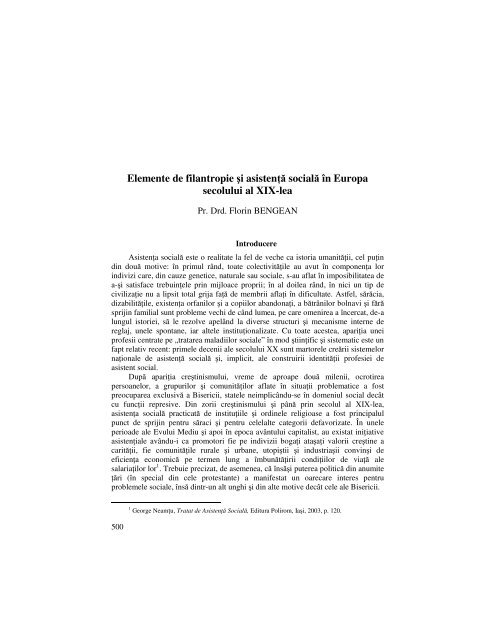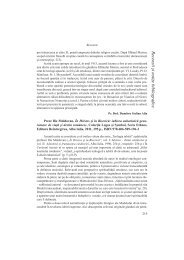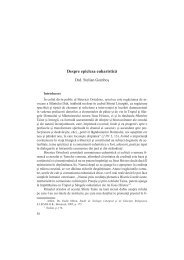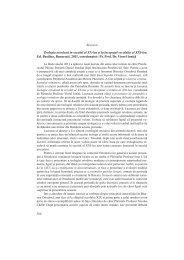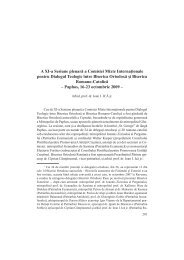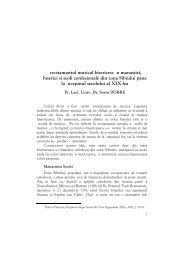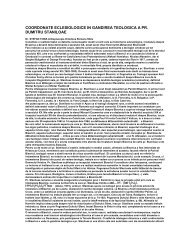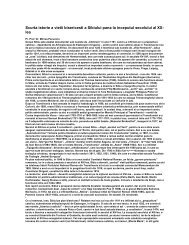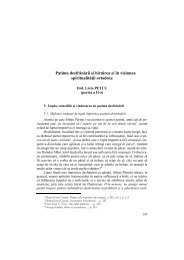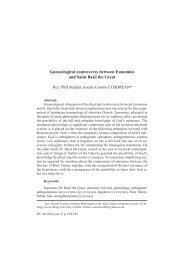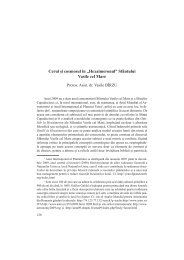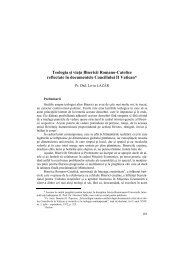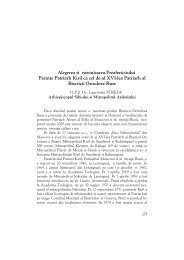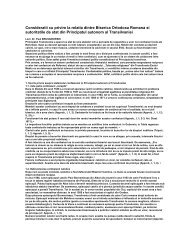Elemente de filantropie şi asisten ă socială în ... - Revista Teologica
Elemente de filantropie şi asisten ă socială în ... - Revista Teologica
Elemente de filantropie şi asisten ă socială în ... - Revista Teologica
Create successful ePaper yourself
Turn your PDF publications into a flip-book with our unique Google optimized e-Paper software.
STUDII ŞI ARTICOLE<br />
500<br />
<strong>Elemente</strong> <strong>de</strong> <strong>filantropie</strong> <strong>şi</strong> <strong>asisten</strong>ţ<strong>ă</strong> social<strong>ă</strong> <strong>în</strong> Europa<br />
secolului al XIX-lea<br />
Pr. Drd. Florin BENGEAN<br />
Introducere<br />
Asistenţa social<strong>ă</strong> este o realitate la fel <strong>de</strong> veche ca istoria umanit<strong>ă</strong>ţii, cel puţin<br />
din dou<strong>ă</strong> motive: <strong>în</strong> primul rând, toate colectivit<strong>ă</strong>ţile au avut <strong>în</strong> componenţa lor<br />
indivizi care, din cauze genetice, naturale sau sociale, s-au aflat <strong>în</strong> imposibilitatea <strong>de</strong><br />
a-<strong>şi</strong> satisface trebuinţele prin mijloace proprii; <strong>în</strong> al doilea rând, <strong>în</strong> nici un tip <strong>de</strong><br />
civilizaţie nu a lipsit total grija faţ<strong>ă</strong> <strong>de</strong> membrii aflaţi <strong>în</strong> dificultate. Astfel, s<strong>ă</strong>r<strong>ă</strong>cia,<br />
dizabilit<strong>ă</strong>ţile, existenţa orfanilor <strong>şi</strong> a copiilor abandonaţi, a b<strong>ă</strong>trânilor bolnavi <strong>şi</strong> f<strong>ă</strong>r<strong>ă</strong><br />
sprijin familial sunt probleme vechi <strong>de</strong> când lumea, pe care omenirea a <strong>în</strong>cercat, <strong>de</strong>-a<br />
lungul istoriei, s<strong>ă</strong> le rezolve apelând la diverse structuri <strong>şi</strong> mecanisme interne <strong>de</strong><br />
reglaj, unele spontane, iar altele instituţionalizate. Cu toate acestea, apariţia unei<br />
profesii centrate pe „tratarea maladiilor sociale” <strong>în</strong> mod ştiinţific <strong>şi</strong> sistematic este un<br />
fapt relativ recent: primele <strong>de</strong>cenii ale secolului XX sunt martorele cre<strong>ă</strong>rii sistemelor<br />
naţionale <strong>de</strong> <strong>asisten</strong>ţ<strong>ă</strong> social<strong>ă</strong> <strong>şi</strong>, implicit, ale construirii i<strong>de</strong>ntit<strong>ă</strong>ţii profesiei <strong>de</strong><br />
<strong>asisten</strong>t social.<br />
Dup<strong>ă</strong> apariţia creştinismului, vreme <strong>de</strong> aproape dou<strong>ă</strong> milenii, ocrotirea<br />
persoanelor, a grupurilor <strong>şi</strong> comunit<strong>ă</strong>ţilor aflate <strong>în</strong> situaţii problematice a fost<br />
preocuparea exclusiv<strong>ă</strong> a Bisericii, statele neimplicându-se <strong>în</strong> domeniul social <strong>de</strong>cât<br />
cu funcţii represive. Din zorii creştinismului <strong>şi</strong> pân<strong>ă</strong> prin secolul al XIX-lea,<br />
<strong>asisten</strong>ţa social<strong>ă</strong> practicat<strong>ă</strong> <strong>de</strong> instituţiile <strong>şi</strong> ordinele religioase a fost principalul<br />
punct <strong>de</strong> sprijin pentru s<strong>ă</strong>raci <strong>şi</strong> pentru celelalte categorii <strong>de</strong>favorizate. În unele<br />
perioa<strong>de</strong> ale Evului Mediu <strong>şi</strong> apoi <strong>în</strong> epoca avântului capitalist, au existat iniţiative<br />
<strong>asisten</strong>ţiale avându-i ca promotori fie pe indivizii bogaţi ataşaţi valorii creştine a<br />
carit<strong>ă</strong>ţii, fie comunit<strong>ă</strong>ţile rurale <strong>şi</strong> urbane, utopiştii <strong>şi</strong> industria<strong>şi</strong>i convin<strong>şi</strong> <strong>de</strong><br />
eficienţa economic<strong>ă</strong> pe termen lung a îmbun<strong>ă</strong>t<strong>ă</strong>ţirii condiţiilor <strong>de</strong> viaţ<strong>ă</strong> ale<br />
salariaţilor lor 1 . Trebuie precizat, <strong>de</strong> asemenea, c<strong>ă</strong> <strong>în</strong>s<strong>ă</strong><strong>şi</strong> puterea politic<strong>ă</strong> din anumite<br />
ţ<strong>ă</strong>ri (<strong>în</strong> special din cele protestante) a manifestat un oarecare interes pentru<br />
problemele sociale, <strong>în</strong>s<strong>ă</strong> dintr-un alt unghi <strong>şi</strong> din alte motive <strong>de</strong>cât cele ale Bisericii.<br />
1 George Neamţu, Tratat <strong>de</strong> Asistenţ<strong>ă</strong> Social<strong>ă</strong>, Editura Polirom, Ia<strong>şi</strong>, 2003, p. 120.
<strong>Elemente</strong> <strong>de</strong> <strong>filantropie</strong> <strong>şi</strong> <strong>asisten</strong>ţ<strong>ă</strong> social<strong>ă</strong> <strong>în</strong> Europa secolului al XIX-lea<br />
Începuturile creştinismului au fost marcate <strong>de</strong> prigoana practicat<strong>ă</strong> <strong>de</strong>opotriv<strong>ă</strong> <strong>de</strong><br />
autorit<strong>ă</strong>ţile imperiale <strong>şi</strong> <strong>de</strong> religiile concurente, astfel <strong>în</strong>cât primii creştini au trebuit<br />
s<strong>ă</strong> se preocupe mai mult <strong>de</strong> supravieţuirea comunit<strong>ă</strong>ţilor lor <strong>de</strong>cât <strong>de</strong> implicarea <strong>în</strong><br />
misiuni sociale. Abia dup<strong>ă</strong> oficializarea creştinismului ca religie <strong>de</strong> stat a fost<br />
posibil<strong>ă</strong>, sub ocrotirea împ<strong>ă</strong>raţilor romani, <strong>de</strong> la Constantin cel Mare <strong>şi</strong> pân<strong>ă</strong> la<br />
Iustinian, <strong>în</strong>fiinţarea câtorva instituţii <strong>asisten</strong>ţiale. Funcţionând autonom sau <strong>în</strong><br />
interiorul aşez<strong>ă</strong>mintelor religioase, respectivele instituţii se bucurau <strong>de</strong> suportul<br />
material <strong>şi</strong> <strong>de</strong> <strong>în</strong>drumarea spiritual<strong>ă</strong> a Bisericii, prin episcopi, educatori religio<strong>şi</strong> <strong>şi</strong><br />
duhovnici.<br />
Indiferent <strong>de</strong> beneficiarul lor, acţiunile <strong>asisten</strong>ţiale ale Bisericii s-au <strong>în</strong>temeiat<br />
<strong>în</strong> primul rând pe o concepţie „pozitiv<strong>ă</strong>” <strong>de</strong>spre s<strong>ă</strong>r<strong>ă</strong>cie. Ţinând <strong>de</strong> o ordine social<strong>ă</strong><br />
pe care Dumnezeu a creat-o, existenţa bog<strong>ă</strong>ţiei <strong>şi</strong> a s<strong>ă</strong>r<strong>ă</strong>ciei reprezenta un fapt<br />
normal <strong>în</strong> lumea feudal<strong>ă</strong> <strong>şi</strong> chiar un fapt pozitiv <strong>în</strong> multe privinţe: pe <strong>de</strong> o parte, a te<br />
naşte <strong>şi</strong> a tr<strong>ă</strong>i <strong>în</strong> s<strong>ă</strong>r<strong>ă</strong>cie reprezenta o şans<strong>ă</strong> pentru dobândirea vieţii veşnice dup<strong>ă</strong><br />
moarte; pe <strong>de</strong> alt<strong>ă</strong> parte, s<strong>ă</strong>r<strong>ă</strong>cia d<strong>ă</strong><strong>de</strong>a şansa celor bogaţi <strong>de</strong> a practica milostenia,<br />
caritatea, f<strong>ă</strong>r<strong>ă</strong> <strong>de</strong> care nu puteau spera la salvarea sufletelor lor. Aşadar, nu numai c<strong>ă</strong><br />
s<strong>ă</strong>r<strong>ă</strong>cia nu era consi<strong>de</strong>rat<strong>ă</strong> o problem<strong>ă</strong>, ci, dimpotriv<strong>ă</strong>, ea era i<strong>de</strong>alizat<strong>ă</strong>, valorizat<strong>ă</strong> <strong>în</strong><br />
termeni pozitivi. În planul relaţiilor sociale <strong>şi</strong> politice, aceast<strong>ă</strong> concepţie conducea la<br />
justificarea ordinii sociale existente <strong>şi</strong> la absolvirea statului <strong>de</strong> orice responsabilitate<br />
faţ<strong>ă</strong> <strong>de</strong> supu<strong>şi</strong>i s<strong>ă</strong>i s<strong>ă</strong>raci. Odat<strong>ă</strong> cu <strong>de</strong>str<strong>ă</strong>marea sistemului feudal din economia<br />
Europei Occi<strong>de</strong>ntale (<strong>în</strong>cepând cu secolul al XV-lea) <strong>şi</strong> cu apariţia raporturilor <strong>de</strong><br />
munc<strong>ă</strong> specifice capitalismului – raporturi <strong>în</strong>tre patron <strong>şi</strong> salariat –, se observ<strong>ă</strong> o<br />
creştere a mobilit<strong>ă</strong>ţii populaţiei <strong>şi</strong> naşterea unei noi categorii <strong>de</strong> s<strong>ă</strong>raci: oamenii din<br />
mediul rural lipsiţi <strong>de</strong> p<strong>ă</strong>mânt sau <strong>de</strong> alte mijloace materiale <strong>şi</strong> care caut<strong>ă</strong> <strong>în</strong> oraşe o<br />
slujb<strong>ă</strong> pentru a-<strong>şi</strong> asigura subzistenţa. „Deposedaţii”, cei „f<strong>ă</strong>r<strong>ă</strong> st<strong>ă</strong>pân” <strong>şi</strong> „f<strong>ă</strong>r<strong>ă</strong><br />
meserie” <strong>în</strong>groaş<strong>ă</strong> rândurile s<strong>ă</strong>r<strong>ă</strong>cimii oraşelor. Nobilimea se simte din ce <strong>în</strong> ce mai<br />
puţin responsabil<strong>ă</strong> faţ<strong>ă</strong> <strong>de</strong> populaţia <strong>de</strong> pe domenii, iar puterea regal<strong>ă</strong> (statul) caut<strong>ă</strong><br />
s<strong>ă</strong> pun<strong>ă</strong> <strong>în</strong> sarcina Bisericii obligaţia <strong>de</strong> a-i asista pe s<strong>ă</strong>raci 2 . M<strong>ă</strong>n<strong>ă</strong>stirile, bisericile,<br />
spitalele <strong>şi</strong> alte instituţii <strong>în</strong>treţinute <strong>de</strong> c<strong>ă</strong>tre Biseric<strong>ă</strong> <strong>de</strong>venir<strong>ă</strong> reţeaua naţional<strong>ă</strong> <strong>de</strong><br />
<strong>asisten</strong>ţ<strong>ă</strong> a s<strong>ă</strong>racilor. Totu<strong>şi</strong>, responsabilitatea lor era moral<strong>ă</strong>, <strong>şi</strong> nu contractual<strong>ă</strong>, ca<br />
aceea care exista <strong>în</strong>tre şerbi <strong>şi</strong> nobili. Întrucât economia liberal<strong>ă</strong> ce se n<strong>ă</strong>ştea nu<br />
oferea practic nici o şans<strong>ă</strong> <strong>de</strong> supravieţuire celor care nu aveau un loc <strong>de</strong> munc<strong>ă</strong> <strong>şi</strong> un<br />
salariu, singura lor speranţ<strong>ă</strong> o reprezenta caritatea creştin<strong>ă</strong>.<br />
Cu toate c<strong>ă</strong> la <strong>în</strong>ceputul epocii mo<strong>de</strong>rne s<strong>ă</strong>r<strong>ă</strong>cia nu era consi<strong>de</strong>rat<strong>ă</strong> <strong>în</strong>c<strong>ă</strong> o<br />
problem<strong>ă</strong> social<strong>ă</strong>, ci doar una moral-religioas<strong>ă</strong>, puterea politic<strong>ă</strong> percepea totu<strong>şi</strong> ca pe<br />
un fapt <strong>de</strong>osebit <strong>de</strong> grav creşterea populaţiei urbane s<strong>ă</strong>race, aflat<strong>ă</strong> <strong>în</strong> c<strong>ă</strong>utare <strong>de</strong><br />
slujbe <strong>şi</strong> nevoit<strong>ă</strong> s<strong>ă</strong> cerşeasc<strong>ă</strong>. Aceast<strong>ă</strong> mas<strong>ă</strong> uman<strong>ă</strong> reprezenta o ameninţare f<strong>ă</strong>r<strong>ă</strong><br />
prece<strong>de</strong>nt pentru ordinea social<strong>ă</strong>, aşa <strong>în</strong>cât statul s-a simţit dator s<strong>ă</strong> reacţioneze.<br />
Pentru a-<strong>şi</strong> justifica m<strong>ă</strong>surile represive contra s<strong>ă</strong>racilor, statul avea nevoie <strong>de</strong> o<br />
schimbare <strong>de</strong> optic<strong>ă</strong> <strong>în</strong> privinţa interpret<strong>ă</strong>rii creştine a s<strong>ă</strong>r<strong>ă</strong>ciei. De la imaginea<br />
2 Ibi<strong>de</strong>m, p. 121.<br />
501
STUDII ŞI ARTICOLE<br />
pozitiv<strong>ă</strong> pe care o avea <strong>în</strong> Evul Mediu timpuriu, la sfâr<strong>şi</strong>tul acestei epoci, s<strong>ă</strong>r<strong>ă</strong>cia nu<br />
mai era v<strong>ă</strong>zut<strong>ă</strong> ca o şans<strong>ă</strong> <strong>şi</strong> o virtute, ci, dimpotriv<strong>ă</strong>, ca un rezultat al leneviei, ca o<br />
greşeal<strong>ă</strong> moral<strong>ă</strong> <strong>şi</strong> chiar ca o crim<strong>ă</strong> <strong>şi</strong> o subversiune ce trebuie reprimate. Renaşterea<br />
contribuie <strong>şi</strong> ea la ştergerea „pozitivit<strong>ă</strong>ţii mistice” a s<strong>ă</strong>r<strong>ă</strong>ciei, iar Reforma lui Luther<br />
<strong>şi</strong> a lui Calvin îi retrage s<strong>ă</strong>r<strong>ă</strong>ciei sensul s<strong>ă</strong>u absolut. În aceste condiţii, secolele XIV-<br />
XVII vor cunoaşte <strong>de</strong>zvoltarea unei legislaţii menite s<strong>ă</strong> reduc<strong>ă</strong> mobilitatea social<strong>ă</strong> <strong>şi</strong><br />
s<strong>ă</strong> pe<strong>de</strong>pseasc<strong>ă</strong> vagabondajul <strong>şi</strong> cerşetoria. L<strong>ă</strong>sând pe seama Bisericii sarcina<br />
<strong>asisten</strong>ţei sociale propriu-zise, statul se <strong>de</strong>dic<strong>ă</strong> unei „<strong>asisten</strong>ţe represive”, <strong>de</strong>rivate<br />
din datoria lui <strong>de</strong> a ap<strong>ă</strong>ra pacea <strong>şi</strong> statu-quo-ul.<br />
În ţ<strong>ă</strong>rile catolice <strong>şi</strong> <strong>în</strong> lumea ortodox<strong>ă</strong>, <strong>în</strong> pofida unor <strong>în</strong>cerc<strong>ă</strong>ri <strong>de</strong> reconsi<strong>de</strong>rare<br />
a statutului moral al s<strong>ă</strong>r<strong>ă</strong>ciei <strong>şi</strong> al carit<strong>ă</strong>ţii, Biserica va continua s<strong>ă</strong> practice <strong>şi</strong> s<strong>ă</strong><br />
propov<strong>ă</strong>duiasc<strong>ă</strong> un comportament <strong>asisten</strong>ţial faţ<strong>ă</strong> <strong>de</strong> s<strong>ă</strong>raci, r<strong>ă</strong>mânând pân<strong>ă</strong> <strong>în</strong> secolul<br />
al XIX-lea cel mai important actor cu responsabilit<strong>ă</strong>ţi sociale. Doctrina creştin<strong>ă</strong><br />
tradiţional<strong>ă</strong> a continuat s<strong>ă</strong> influenţeze spiritul prestaţiilor sociale <strong>şi</strong> dup<strong>ă</strong> secularizare,<br />
<strong>de</strong>monstrând adânca ei <strong>în</strong>r<strong>ă</strong>d<strong>ă</strong>cinare <strong>în</strong> conştiinţa colectiv<strong>ă</strong> 3 . Insistând asupra<br />
insuficienţei <strong>şi</strong> slabei eficienţe a acţiunilor particulare <strong>de</strong> ajutorare a celor n<strong>ă</strong>p<strong>ă</strong>stuiţi,<br />
criticând formele <strong>de</strong> <strong>asisten</strong>ţ<strong>ă</strong> care nu fac <strong>de</strong>cât s<strong>ă</strong> <strong>în</strong>treţin<strong>ă</strong> starea <strong>de</strong> mizerie <strong>şi</strong><br />
observând c<strong>ă</strong>, a<strong>de</strong>sea, s<strong>ă</strong>r<strong>ă</strong>cia se conjug<strong>ă</strong> cu viciul <strong>şi</strong> imoralitatea, Biserica <strong>şi</strong> statul<br />
<strong>de</strong>opotriv<strong>ă</strong> vor percepe s<strong>ă</strong>r<strong>ă</strong>cia ca pe o problem<strong>ă</strong> social<strong>ă</strong> <strong>şi</strong> ca pe o ameninţare la<br />
adresa ordinii instituite. În consecinţ<strong>ă</strong>, nu se va mai pune problema ajutor<strong>ă</strong>rii<br />
s<strong>ă</strong>racilor, ci aceea a transform<strong>ă</strong>rii lor <strong>în</strong> elemente inofensive pentru ordinea social<strong>ă</strong>.<br />
Pentru aceasta, Biserica <strong>şi</strong> statul au ajuns la crearea unor instituţii (ca spitalul public<br />
<strong>şi</strong> azilul) specializate <strong>în</strong> internarea <strong>şi</strong> ţinerea sub control a celor mai s<strong>ă</strong>raci <strong>şi</strong> mai<br />
vicio<strong>şi</strong> indivizi 4 .<br />
502<br />
<strong>Elemente</strong> <strong>asisten</strong>ţiale <strong>în</strong> secolul al XIX-lea <strong>în</strong> Europa<br />
Revoluţia francez<strong>ă</strong> antreneaz<strong>ă</strong> o criz<strong>ă</strong> profund<strong>ă</strong> a sistemului <strong>de</strong> ajutor care<br />
predomina <strong>în</strong> societatea tradiţional<strong>ă</strong>. Spitalul este lipsit <strong>de</strong> o mare parte a resurselor<br />
sale prin secularizarea bunurilor Bisericii. Criza instituţiilor religioase merge <strong>în</strong><br />
acela<strong>şi</strong> sens. Ajutorul muncitorilor, afectat <strong>de</strong> dislocarea organizaţiilor corporative,<br />
nu-<strong>şi</strong> g<strong>ă</strong>seşte a<strong>de</strong>v<strong>ă</strong>rata compensaţie <strong>în</strong> noua politic<strong>ă</strong> a Adun<strong>ă</strong>rilor. Pe <strong>de</strong> o parte,<br />
Comitetul pentru cerşetorie al Adun<strong>ă</strong>rii constituante afirm<strong>ă</strong> c<strong>ă</strong> nu exist<strong>ă</strong> datorie mai<br />
important<strong>ă</strong> pentru noua societate, fondat<strong>ă</strong> pe un contract <strong>în</strong>tre oamenii liberi, <strong>de</strong>cât<br />
eradicarea s<strong>ă</strong>r<strong>ă</strong>ciei. Pe <strong>de</strong> alt<strong>ă</strong> parte, filozofia social<strong>ă</strong> a Revoluţiei <strong>de</strong>zvolt<strong>ă</strong> o cu totul<br />
alt<strong>ă</strong> perspectiv<strong>ă</strong> valorizând libertatea individului, autonomia sa necesar<strong>ă</strong>,<br />
emanciparea sa, m<strong>ă</strong>surat<strong>ă</strong> prin retragerea statului. În practic<strong>ă</strong>, Comitetul pentru<br />
cerşetorie, inspirându-se din reflexiile anterioare ale lui J. Necker, îi ajut<strong>ă</strong> pe infirmi<br />
<strong>şi</strong> b<strong>ă</strong>trâni, d<strong>ă</strong> <strong>de</strong> lucru s<strong>ă</strong>racilor valizi <strong>şi</strong> reprim<strong>ă</strong> cer<strong>şi</strong>tul <strong>şi</strong> pomana. Atunci când<br />
3 Ibi<strong>de</strong>m, p. 122.<br />
4 Ibi<strong>de</strong>m, p. 123.
<strong>Elemente</strong> <strong>de</strong> <strong>filantropie</strong> <strong>şi</strong> <strong>asisten</strong>ţ<strong>ă</strong> social<strong>ă</strong> <strong>în</strong> Europa secolului al XIX-lea<br />
atelierele <strong>de</strong> caritate sau <strong>de</strong> ajutor sunt <strong>de</strong>p<strong>ă</strong><strong>şi</strong>te <strong>de</strong> num<strong>ă</strong>rul s<strong>ă</strong>racilor, chestiunea<br />
<strong>asisten</strong>ţei se politizeaz<strong>ă</strong>. Comitetul recomand<strong>ă</strong> vânzarea <strong>în</strong> mici loturi a bunurilor<br />
naţionale, c<strong>ă</strong>ci accesul la proprietatea individual<strong>ă</strong> pare cea mai bun<strong>ă</strong> modalitate <strong>de</strong> a<br />
se feri <strong>de</strong> s<strong>ă</strong>r<strong>ă</strong>cie 5 . Dar Adunarea Constituant<strong>ă</strong> este frânat<strong>ă</strong> <strong>de</strong> grija sa <strong>de</strong> a nu aduce<br />
atingere dreptului <strong>de</strong> proprietate. Dac<strong>ă</strong> Adunarea legislativ<strong>ă</strong> proclam<strong>ă</strong> dreptul la<br />
munc<strong>ă</strong> <strong>şi</strong> la <strong>asisten</strong>ţ<strong>ă</strong>, realiz<strong>ă</strong>rile concrete nu merg <strong>de</strong>loc mai <strong>de</strong>parte. Mai ales pe<br />
plan local s-au creat „birouri <strong>de</strong> binefacere” <strong>şi</strong> societ<strong>ă</strong>ţi filantropice graţie iniţiativei<br />
municipalit<strong>ă</strong>ţilor <strong>şi</strong> a societ<strong>ă</strong>ţilor populare. Acest efort nu compenseaz<strong>ă</strong> dispariţia<br />
ajutoarelor tradiţionale.<br />
Creşterea popular<strong>ă</strong>, r<strong>ă</strong>zboiul, voinţa Convenţiei montagnar<strong>de</strong> <strong>de</strong> a organiza o<br />
a<strong>de</strong>v<strong>ă</strong>rat<strong>ă</strong> politic<strong>ă</strong> a ajutoarelor publice impun <strong>în</strong> mod oficial dreptul la <strong>asisten</strong>ţ<strong>ă</strong> <strong>în</strong><br />
Constituţia din 1793. Împ<strong>ă</strong>rţirea bunurilor naţionale îi avantajeaz<strong>ă</strong> <strong>de</strong> acum <strong>în</strong>ainte<br />
pe „cei mici”. Marea – Carte a Binefacerii naţionale <strong>în</strong>ţelege s<strong>ă</strong> protejeze<br />
persoanele <strong>în</strong> vârst<strong>ă</strong>, mamele, v<strong>ă</strong>duvele, orfanii. Spitalele <strong>şi</strong> pomenile sunt <strong>în</strong>locuite<br />
<strong>de</strong> <strong>în</strong>grijiri <strong>şi</strong> un ajutor la domiciliu. Aceast<strong>ă</strong> politic<strong>ă</strong> este rapid ipotecat<strong>ă</strong> prin<br />
inflaţie, <strong>de</strong> r<strong>ă</strong>zboiul care rezerv<strong>ă</strong> ajutoarele familiilor soldaţilor patrioţi, prin reacţia<br />
termidorian<strong>ă</strong> care antreneaz<strong>ă</strong> abandonul politicii naţionale <strong>de</strong> binefacere.<br />
Odat<strong>ă</strong> mişcarea popular<strong>ă</strong> <strong>în</strong>vins<strong>ă</strong>, opţiunea „liberal<strong>ă</strong>” este cea care <strong>în</strong>vinge <strong>în</strong><br />
filozofia notabililor <strong>de</strong> la <strong>în</strong>ceputul secolului al XIX-lea. Aceea<strong>şi</strong> mişcare <strong>de</strong><br />
respingere a politicilor costisitoare <strong>de</strong>zvoltate <strong>de</strong> marile monarhii ale secolului al<br />
XVIII-lea se <strong>de</strong>sf<strong>ă</strong>şoar<strong>ă</strong> <strong>în</strong> Europa. Dar elitele nu au <strong>de</strong>loc sentimentul c<strong>ă</strong> sunt<br />
retrogra<strong>de</strong>. Dimpotriv<strong>ă</strong>, chestiunea social<strong>ă</strong> este trecut<strong>ă</strong> prin filtrul teoriilor<br />
economice cele mai mo<strong>de</strong>rne. Se multiplic<strong>ă</strong> anchetele <strong>în</strong> zonele <strong>de</strong> umbr<strong>ă</strong> ale<br />
societ<strong>ă</strong>ţii. Toate soluţiile examinate sunt raportate la calcule riguroase <strong>de</strong><br />
rentabilitate care, micşorând costul meto<strong>de</strong>lor <strong>de</strong> lupt<strong>ă</strong> împotriva s<strong>ă</strong>r<strong>ă</strong>ciei, trebuie <strong>în</strong><br />
acela<strong>şi</strong> timp s<strong>ă</strong> o trateze mai uşor. Acest <strong>de</strong>mers s-a elaborat pe etape <strong>de</strong> la sfâr<strong>şi</strong>tul<br />
secolului a XVIII-lea sub influenţa economiştilor englezi. T.R. Malthus <strong>şi</strong> Nassau<br />
Senior afirm<strong>ă</strong> c<strong>ă</strong> orice ajutor prelungit al statului duce la pier<strong>de</strong>rea libert<strong>ă</strong>ţii. În<br />
lucrarea sa, Essai sur le principe <strong>de</strong> population (1798), Malthus afirm<strong>ă</strong> c<strong>ă</strong> legea<br />
s<strong>ă</strong>racilor <strong>în</strong>curajeaz<strong>ă</strong> menţinerea activit<strong>ă</strong>ţilor nerentabile <strong>în</strong> <strong>de</strong>trimentul unei mai<br />
bune utiliz<strong>ă</strong>ri a mâinii <strong>de</strong> lucru. Legea „produce” suprapopulaţia care ea <strong>în</strong>s<strong>ă</strong><strong>şi</strong><br />
explic<strong>ă</strong> sporirea mizeriei. Reintroducerea muncii <strong>în</strong> mecanismele <strong>asisten</strong>ţei trebuie<br />
s<strong>ă</strong> permit<strong>ă</strong> politicii sociale s<strong>ă</strong> se finanţeze ea <strong>în</strong>s<strong>ă</strong><strong>şi</strong>.<br />
Chestiunea social<strong>ă</strong> este atunci circumscris<strong>ă</strong> unui teren <strong>în</strong>gust. Politica social<strong>ă</strong> îi<br />
priveşte <strong>de</strong> fapt pe copiii abandonaţi, pe nevoia<strong>şi</strong>, pe bolnavii incurabili, pe invalizi,<br />
pe b<strong>ă</strong>trâni, care nu mai sunt capabili s<strong>ă</strong>-<strong>şi</strong> câştige existenţa prin munc<strong>ă</strong>. Dincolo <strong>de</strong><br />
aceasta trebuie d<strong>ă</strong>râmat un <strong>în</strong>treg sistem <strong>de</strong> <strong>asisten</strong>ţ<strong>ă</strong> care se sprijin<strong>ă</strong> pe spitalul<br />
general, pe taxele al c<strong>ă</strong>ror cost „exorbitant” este datorat unei politici <strong>de</strong> primire<br />
tolerante. Filantropii <strong>şi</strong> economiştii ple<strong>de</strong>az<strong>ă</strong> pentru „externalizarea din spital”. Ei<br />
p. 13.<br />
5 Francis Demier, Istoria politicilor sociale, Europa, sec. XIX-XX, Institutul European, Ia<strong>şi</strong>, 1998,<br />
503
STUDII ŞI ARTICOLE<br />
sunt <strong>de</strong> acord <strong>şi</strong> cu introducerea, acolo un<strong>de</strong> este posibil, a formelor <strong>de</strong> munc<strong>ă</strong> chiar<br />
rudimentare <strong>în</strong> instituţiile <strong>de</strong> <strong>asisten</strong>ţ<strong>ă</strong> tradiţional<strong>ă</strong> 6 . Taxa englez<strong>ă</strong> a s<strong>ă</strong>racilor<br />
simbolizeaz<strong>ă</strong> toate <strong>de</strong>fectele vechiului sistem <strong>de</strong> <strong>asisten</strong>ţ<strong>ă</strong>. În 1775 taxa se ridica la 2<br />
milioane <strong>de</strong> lire, <strong>în</strong> 1831 ea atinge 7 milioane <strong>şi</strong> ameninţ<strong>ă</strong> s<strong>ă</strong> antreneze o revolt<strong>ă</strong> a<br />
contribuabililor. Prelevarea este totu<strong>şi</strong> foarte inegal<strong>ă</strong>, dup<strong>ă</strong> parohii. În anumite<br />
cazuri, sistemul a evoluat spre o subvenţie s<strong>ă</strong>pt<strong>ă</strong>mânal<strong>ă</strong> pentru lucr<strong>ă</strong>torii agricoli <strong>şi</strong><br />
familiile lor, subvenţie proporţional<strong>ă</strong> cu preţul grâului. Este vorba <strong>de</strong>spre<br />
„Speenhamland System”, larg r<strong>ă</strong>spândit <strong>în</strong> sudul Angliei. Cultivatorii <strong>în</strong>st<strong>ă</strong>riţi sunt<br />
constrân<strong>şi</strong> s<strong>ă</strong> se foloseasc<strong>ă</strong> <strong>de</strong> asistaţi. Cum orice parohie trebuie s<strong>ă</strong>-<strong>şi</strong> hr<strong>ă</strong>neasc<strong>ă</strong><br />
s<strong>ă</strong>racii, ea <strong>în</strong><strong>de</strong>p<strong>ă</strong>rteaz<strong>ă</strong> din toate puterile pe noii veniţi. Se voteaz<strong>ă</strong> <strong>în</strong> 1834 o lege<br />
care îi <strong>de</strong>termin<strong>ă</strong> pe s<strong>ă</strong>raci s<strong>ă</strong> extind<strong>ă</strong> limitele suferinţei <strong>în</strong>ainte <strong>de</strong> a solicita o<br />
<strong>asisten</strong>ţ<strong>ă</strong>. Un „test” permite filtrarea sever<strong>ă</strong> a celor care au dreptul la aceasta. Taxa<br />
este <strong>de</strong> acum <strong>în</strong>ainte prelevat<strong>ă</strong> <strong>în</strong> cadrul mai vast al unei „uniuni” <strong>de</strong> parohii. Fiecare<br />
uniune este supus<strong>ă</strong> unui comitet <strong>de</strong> supraveghere format din curatori numiţi <strong>de</strong> toţi<br />
contribuabilii taxaţi. Comitetul gardienilor fixeaz<strong>ă</strong> taxa, controleaz<strong>ă</strong> distribuirea<br />
ajutoarelor, sub autoritatea central<strong>ă</strong> a trei comisari din Londra. Parohiile nu mai<br />
trebuie s<strong>ă</strong> acor<strong>de</strong> ajutoare s<strong>ă</strong>racilor valizi. Ajutoarele nu mai sunt distribuite dup<strong>ă</strong><br />
preţul grâului <strong>şi</strong> num<strong>ă</strong>rul copiilor. În 1838 legea se extin<strong>de</strong> <strong>în</strong> Irlanda.<br />
Odat<strong>ă</strong> cu ocupaţia francez<strong>ă</strong>, laicizarea <strong>şi</strong> centralizarea binefacerii au progresat.<br />
Ca <strong>şi</strong> <strong>în</strong> sistemul francez, o parte a s<strong>ă</strong>racilor este aruncat<strong>ă</strong> spre <strong>de</strong>pozitele <strong>de</strong> cer<strong>şi</strong>t,<br />
plasate <strong>în</strong> sarcina comunelor sau statului atunci când acestea sunt sl<strong>ă</strong>bite. Dar<br />
structurile tradiţionale <strong>de</strong> <strong>asisten</strong>ţ<strong>ă</strong> public<strong>ă</strong> centrate pe comun<strong>ă</strong>, ospiciile <strong>şi</strong> comisiile<br />
<strong>de</strong> <strong>asisten</strong>ţ<strong>ă</strong> public<strong>ă</strong> girate <strong>de</strong> municipalit<strong>ă</strong>ţi se menţin.<br />
Operele <strong>de</strong> caritate creştin<strong>ă</strong>, eclipsate sub ocupaţia francez<strong>ă</strong>, î<strong>şi</strong> restabilesc<br />
influenţa dup<strong>ă</strong> 1815 <strong>în</strong> ţ<strong>ă</strong>rile <strong>în</strong> care pon<strong>de</strong>rea statului este foarte limitat<strong>ă</strong>.<br />
Închisoarea-manufactur<strong>ă</strong> triumf<strong>ă</strong> <strong>în</strong> Flandra <strong>şi</strong> <strong>în</strong> Brabant sub influenţa guvernului<br />
austriac <strong>şi</strong> <strong>în</strong> tradiţia caselor <strong>de</strong> corecţie urbane care funcţionau din secolul al XVIIlea.<br />
Operele private <strong>de</strong> caritate creştin<strong>ă</strong> se reconstituie, mai ales filantropia<br />
penitenciar<strong>ă</strong>. Autonomia comunal<strong>ă</strong> din 1836 pune <strong>în</strong> sarcina comunelor <strong>în</strong>treţinerea<br />
s<strong>ă</strong>racilor <strong>de</strong> c<strong>ă</strong>tre ospicii <strong>şi</strong> birourile <strong>de</strong> binefacere. O <strong>filantropie</strong> mixt<strong>ă</strong> asociaz<strong>ă</strong><br />
iniţiativa catolic<strong>ă</strong> privat<strong>ă</strong> <strong>şi</strong> municipalit<strong>ă</strong>ţile: este cazul Societ<strong>ă</strong>ţii <strong>de</strong> <strong>filantropie</strong> din<br />
Bruxelles, creat<strong>ă</strong> <strong>în</strong> 1828.<br />
Exist<strong>ă</strong> o mare diferenţ<strong>ă</strong> <strong>în</strong>tre proiectul liberal, coerent, eficace <strong>în</strong> teorie <strong>şi</strong><br />
realitatea reformelor <strong>în</strong>treprinse la <strong>în</strong>ceputul secolului al XIX-lea. Proliferarea<br />
s<strong>ă</strong>r<strong>ă</strong>ciei <strong>de</strong>joac<strong>ă</strong> toate proiectele optimiste. Pân<strong>ă</strong> <strong>în</strong> 1830 se tr<strong>ă</strong>ise <strong>în</strong>tr-o ficţiune:<br />
s<strong>ă</strong>r<strong>ă</strong>cia este rezultatul sub<strong>de</strong>zvolt<strong>ă</strong>rii economice a vechii societ<strong>ă</strong>ţi. Progresul va<br />
diminua mizeria. Nimic din toate acestea. În 1840, schimbarea <strong>de</strong> proporţii a<br />
revoluţiei industriale se <strong>în</strong>soţeşte <strong>de</strong> o stagnare, chiar <strong>de</strong> o sc<strong>ă</strong><strong>de</strong>re a salariului, mai<br />
ales <strong>în</strong> sectoarele ameninţate <strong>de</strong> mecanizare. Buzunarele s<strong>ă</strong>race constituie <strong>în</strong> oraşele<br />
manufacturiere, dar <strong>şi</strong> <strong>în</strong> marile capitale pline <strong>de</strong> migratori, elemente <strong>de</strong> <strong>de</strong>stabilizare<br />
504<br />
6 Ibi<strong>de</strong>m, p. 16.
<strong>Elemente</strong> <strong>de</strong> <strong>filantropie</strong> <strong>şi</strong> <strong>asisten</strong>ţ<strong>ă</strong> social<strong>ă</strong> <strong>în</strong> Europa secolului al XIX-lea<br />
care <strong>în</strong> orice moment pot aluneca spre calea revoluţionar<strong>ă</strong>. În 1840, dup<strong>ă</strong> J.B.<br />
Marbeau, inventatorul creşelor, Franţa ar avea 250000 <strong>de</strong> cerşetori, 1,8 milioane <strong>de</strong><br />
nevoia<strong>şi</strong>, 3 milioane <strong>de</strong> indivizi <strong>în</strong>scri<strong>şi</strong> la birourile <strong>de</strong> binefacere <strong>şi</strong> 6 milioane <strong>de</strong><br />
francezi, adic<strong>ă</strong> 1/6 din populaţie are nevoie <strong>de</strong> ajutoare 7 . Aceast<strong>ă</strong> nou<strong>ă</strong> situaţie<br />
multiplic<strong>ă</strong> <strong>în</strong>treb<strong>ă</strong>rile catolicilor sociali francezi asupra supravieţuirii unei societ<strong>ă</strong>ţi<br />
liberale abandonate pieţei, industriei concentrate, marilor oraşe. Trebuie p<strong>ă</strong>strate<br />
marile echilibre protejându-se societatea rural<strong>ă</strong>, mai stabil<strong>ă</strong>. Aceast<strong>ă</strong> i<strong>de</strong>e este<br />
împ<strong>ă</strong>rt<strong>ă</strong><strong>şi</strong>t<strong>ă</strong> <strong>şi</strong> <strong>de</strong> mulţi socialişti care opun bolii <strong>şi</strong> mizeriei urbane proiectul unei noi<br />
comunit<strong>ă</strong>ţi inspirate dintr-un creştinism al originilor <strong>şi</strong> fixate <strong>în</strong> afara oraşului.<br />
Leon al XIII-lea (1878-1903), nu este, la drept vorbind, un pap<strong>ă</strong> al<br />
compromisurilor: el r<strong>ă</strong>mâne certat cu monarhia italian<strong>ă</strong>, îl oblig<strong>ă</strong> pe Bismarck s<strong>ă</strong> fie<br />
mai puţin intransigent <strong>în</strong> relaţiile sale cu clerul catolic <strong>şi</strong> aminteşte cu pl<strong>ă</strong>cere c<strong>ă</strong><br />
Dumnezeu este „singurul izvor al puterii”. Dar <strong>în</strong> acela<strong>şi</strong> timp el accept<strong>ă</strong> „o libertate<br />
s<strong>ă</strong>n<strong>ă</strong>toas<strong>ă</strong> <strong>şi</strong> legitim<strong>ă</strong>”, îi <strong>în</strong><strong>de</strong>amn<strong>ă</strong> pe catolici s<strong>ă</strong> accepte regimurile existente pentru<br />
a-<strong>şi</strong> spori influenţa asupra acestora <strong>şi</strong> le recunoaşte (acolo un<strong>de</strong> Biserica nu este<br />
„persecutat<strong>ă</strong>”) dreptul <strong>de</strong> a lua parte la treburile statului. În Franţa, aceast<strong>ă</strong> atitudine<br />
<strong>de</strong>schi<strong>de</strong> calea spre o a<strong>de</strong>rare la republic<strong>ă</strong>, a c<strong>ă</strong>rei iniţiere, aprobat<strong>ă</strong> prin enciclica În<br />
mijlocul preocup<strong>ă</strong>rilor din 1892, este datorat<strong>ă</strong> cardinalului Lavigerie. Aceasta nu<br />
vrea s<strong>ă</strong> spun<strong>ă</strong> totu<strong>şi</strong> c<strong>ă</strong> Biserica s-a convertit la liberalism, <strong>şi</strong> cu atât mai puţin c<strong>ă</strong><br />
<strong>în</strong>curaj<strong>ă</strong>rile venite <strong>de</strong> la vârf au convins masa catolicilor s<strong>ă</strong> treac<strong>ă</strong> <strong>de</strong> partea<br />
<strong>de</strong>mocraţiei. În ciuda eforturilor f<strong>ă</strong>cute <strong>de</strong> abatele Lemire <strong>şi</strong> <strong>de</strong> Marc Sangnier,<br />
alegerile din 1898 anunţ<strong>ă</strong> prima <strong>în</strong>cercare <strong>de</strong> <strong>în</strong>fiinţare <strong>în</strong> Franţa a unui partid<br />
<strong>de</strong>mocrat-creştin, <strong>în</strong> timp ce, odat<strong>ă</strong> cu afacerea Dreyfus, se adânceşte alianţa dintre<br />
lumea catolic<strong>ă</strong> <strong>şi</strong> conservatorismul cel mai radical 8 .<br />
Interesul manifestat <strong>de</strong> Biseric<strong>ă</strong> pentru „chestiunea social<strong>ă</strong>” marcheaz<strong>ă</strong> <strong>în</strong><br />
acela<strong>şi</strong> timp trezirea conştiinţei catolice <strong>în</strong> faţa problemelor ridicate <strong>de</strong> exploatarea<br />
muncitorilor industriali, evocat<strong>ă</strong> <strong>în</strong> marea enciclic<strong>ă</strong> Rerum novarum (1891), dar <strong>şi</strong> o<br />
respingere confirmat<strong>ă</strong> a mo<strong>de</strong>rnit<strong>ă</strong>ţii. În fapt, cercet<strong>ă</strong>rile <strong>în</strong>treprinse pentru<br />
<strong>de</strong>zvoltarea unui catolicism social (<strong>în</strong> Germania <strong>de</strong> Monseniorul Ketteler, <strong>în</strong> Anglia<br />
<strong>de</strong> cardinalul Manning, <strong>în</strong> Belgia <strong>de</strong> „şcoala din Liege”, <strong>în</strong> Elveţia legate <strong>de</strong> Uniunea<br />
catolic<strong>ă</strong> <strong>de</strong> studii sociale din Fribourg, <strong>în</strong> Franţa <strong>de</strong> Albert <strong>de</strong> Mun <strong>şi</strong> Rene <strong>de</strong> la Tour<br />
du Pin) se bazeaz<strong>ă</strong> pe o viziune paseist<strong>ă</strong> asupra societ<strong>ă</strong>ţii, chiar dac<strong>ă</strong> ajung la un<br />
rechizitoriu sever împotriva capitalismului liberal. Catolicii sociali provin a<strong>de</strong>sea din<br />
rândurile aristocraţiei funciare <strong>şi</strong> viseaz<strong>ă</strong> o <strong>în</strong>toarcere la vechea lume patriarhal<strong>ă</strong><br />
bazat<strong>ă</strong> pe corporaţii. Altfel spus, ei caut<strong>ă</strong> sprijin <strong>în</strong> rândul maselor populare pentru a<br />
lupta împotriva ordinii instaurate <strong>de</strong> burghezia liberal<strong>ă</strong> <strong>şi</strong> anticlerical<strong>ă</strong>. Aceasta nu<br />
<strong>în</strong>seamn<strong>ă</strong> c<strong>ă</strong> simpatia lor pentru cei exploataţi <strong>şi</strong> pentru victimele revoluţiei<br />
industriale nu este sincer<strong>ă</strong>, nici c<strong>ă</strong> nu sunt animaţi <strong>de</strong> o a<strong>de</strong>v<strong>ă</strong>rat<strong>ă</strong> dorinţ<strong>ă</strong> <strong>de</strong><br />
7 Ibi<strong>de</strong>m, p. 19.<br />
8 Serge Berstein&Pierre Milza, Istoria Europei, volumul 4, Institutul European, Ia<strong>şi</strong>, 1998, p. 271.<br />
505
STUDII ŞI ARTICOLE<br />
reform<strong>ă</strong> 9 . Pur <strong>şi</strong> simplu, aceast<strong>ă</strong> dorinţ<strong>ă</strong> se <strong>în</strong>scrie <strong>în</strong>tr-o perspectiv<strong>ă</strong> total diferit<strong>ă</strong> <strong>de</strong><br />
i<strong>de</strong>alurile pe care se sprijin<strong>ă</strong> <strong>de</strong>mocratizarea societ<strong>ă</strong>ţilor europene. Tot la probleme<br />
sociale se refer<strong>ă</strong> <strong>şi</strong> enciclica La civilta cattolica. Enciclica Graves <strong>de</strong> comuni, emis<strong>ă</strong><br />
<strong>de</strong> papa Leon XIII (1878-1903), recunoaşte mişcarea <strong>de</strong>mocrat-creştin<strong>ă</strong> dar îi<br />
limiteaz<strong>ă</strong> raza <strong>de</strong> acţiune. În plus, atrage atenţia c<strong>ă</strong> <strong>în</strong>su<strong>şi</strong> termenul „<strong>de</strong> <strong>de</strong>mocraţie<br />
creştin<strong>ă</strong> nu sun<strong>ă</strong> bine pentru mulţi dintre cei cu scaun la cap, pentru c<strong>ă</strong> v<strong>ă</strong>d <strong>în</strong> spatele<br />
lui ceva ambiguu <strong>şi</strong> periculos. Se tem <strong>de</strong> el nu doar dintr-un singur motiv: aceasta<br />
<strong>de</strong>oarece ei cred c<strong>ă</strong> ar fi un paravan pentru un ţel politic prin care poporul s<strong>ă</strong> fie adus<br />
la putere prin actuala form<strong>ă</strong> <strong>de</strong> guvernare f<strong>ă</strong>r<strong>ă</strong> a se mai c<strong>ă</strong>uta alte soluţii”. Este, prin<br />
urmare, un <strong>în</strong><strong>de</strong>mn la r<strong>ă</strong>mânerea <strong>în</strong> starea <strong>de</strong> „corporatism”. Papa a fost un teolog <strong>şi</strong><br />
un umanist. Înc<strong>ă</strong> <strong>în</strong>ainte <strong>de</strong> a <strong>de</strong>veni pap<strong>ă</strong> <strong>şi</strong>-a ar<strong>ă</strong>tat angajarea social<strong>ă</strong> din funcţia <strong>de</strong><br />
legat papal <strong>în</strong> Benevent <strong>şi</strong> Perugia. Ca pap<strong>ă</strong>, s-a ocupat insistent <strong>de</strong> relaţiile dintre<br />
Biseric<strong>ă</strong> <strong>şi</strong> societatea mo<strong>de</strong>rn<strong>ă</strong>.<br />
Partidul Socialist Creştin, organizat <strong>de</strong> Karl Lueger, a reprezentat prima<br />
<strong>în</strong>cercare a Bisericii <strong>de</strong> a se al<strong>ă</strong>tura maselor, mai <strong>de</strong>mocratic<strong>ă</strong> – <strong>şi</strong> mai <strong>de</strong>magogic<strong>ă</strong> –<br />
<strong>de</strong>cât Centrul, echivalentul s<strong>ă</strong>u german. Socialismul creştin f<strong>ă</strong>cea apel la<br />
religiozitatea tradiţional<strong>ă</strong> a ţ<strong>ă</strong>ranilor, eliberându-i <strong>de</strong> <strong>de</strong>pen<strong>de</strong>nţa faţ<strong>ă</strong> <strong>de</strong> mo<strong>şi</strong>er; mai<br />
mult, <strong>în</strong> ciuda ostilit<strong>ă</strong>ţii ţ<strong>ă</strong>ranilor faţ<strong>ă</strong> <strong>de</strong> oraş, el îi aducea mai aproape <strong>de</strong> pr<strong>ă</strong>v<strong>ă</strong>lia<strong>şi</strong>i<br />
<strong>şi</strong> meşteşugarii ameninţaţi <strong>de</strong> <strong>de</strong>zvoltarea marii industrii. În realitate, Partidul socialcreştin<br />
era versiunea austriac<strong>ă</strong> a Partidului radical din Franţa (sau chiar al<br />
radicalismului englez al lui Lloyd George), numai c<strong>ă</strong> el colabora cu biserica, <strong>în</strong> loc<br />
s<strong>ă</strong> militeze împotriva ei 10 . Scopul s<strong>ă</strong>u era acela <strong>de</strong> a-l ap<strong>ă</strong>ra pe „omul <strong>de</strong> jos” <strong>de</strong><br />
marile companii <strong>şi</strong> <strong>de</strong> sindicate, <strong>de</strong> b<strong>ă</strong>nci <strong>şi</strong> lanţurile <strong>de</strong> magazine, ca <strong>şi</strong> <strong>de</strong> marile<br />
mo<strong>şi</strong>i <strong>şi</strong> <strong>de</strong> agricultura mecanizat<strong>ă</strong>. El <strong>în</strong>cerca s<strong>ă</strong> <strong>de</strong>vieze pasiunile politice tot mai<br />
fierbinţi c<strong>ă</strong>tre direcţii neprimejdioase pentru Biseric<strong>ă</strong>: era antiliberal, antievreiesc,<br />
antimarxist, anticapitalist. Li<strong>de</strong>rii mişc<strong>ă</strong>rii ştiau exact ce doresc: <strong>de</strong><strong>şi</strong> f<strong>ă</strong>ceau apel la<br />
sentimente viscerale, mai ales la antisemitism, erau convin<strong>şi</strong> c<strong>ă</strong> vor putea<br />
<strong>în</strong>tot<strong>de</strong>auna controla pasiunile pe care le treziser<strong>ă</strong>. Lueger <strong>de</strong>clara: „Eu hot<strong>ă</strong>r<strong>ă</strong>sc cine<br />
e evreu”, protejând cu fermitate pe toţi evreii care se ţineau <strong>de</strong>parte <strong>de</strong> liberalism <strong>şi</strong><br />
<strong>de</strong> marxism. Ignaz Seipel, unul din li<strong>de</strong>rii <strong>de</strong> mai târziu, spunea <strong>de</strong>spre<br />
antisemitismul partidului s<strong>ă</strong>u: „E pentru drojdia societ<strong>ă</strong>ţii”. Nu ştia c<strong>ă</strong> drojdia avea<br />
s<strong>ă</strong> îi ucid<strong>ă</strong> <strong>în</strong>tr-o zi succesorul. Socialismul creştin era o <strong>în</strong>cercare <strong>de</strong> a ajunge la<br />
straturile inferioare ale societ<strong>ă</strong>ţii, f<strong>ă</strong>r<strong>ă</strong> ca cei care o f<strong>ă</strong>ceau s<strong>ă</strong> se murd<strong>ă</strong>reasc<strong>ă</strong>. Ca<br />
partid al „oamenilor <strong>de</strong> jos”, el era imperial „prin numire”; suporterii s<strong>ă</strong>i cunoşteau<br />
valoarea obiceiurilor arhiducilor. Austriecii tradiţionalişti s-au ar<strong>ă</strong>tat mai <strong>în</strong>tâi şocaţi<br />
<strong>de</strong> <strong>de</strong>magogia socialist-creştin<strong>ă</strong>; iar <strong>în</strong> anii ’90, Francisc Iosif a refuzat <strong>de</strong> patru ori<br />
s<strong>ă</strong> îl confirme pe Lueger ca primar al Vienei. În 1897, el a fost acceptat, iar dinastia<br />
a recunoscut c<strong>ă</strong> î<strong>şi</strong> g<strong>ă</strong>sise un aliat nou 11 .<br />
506<br />
9 Ibi<strong>de</strong>m, p. 272.<br />
10 A.J.P. Taylor, Monarhia habsburgic<strong>ă</strong> 1809-1918, Editura Allfa, Bucureşti, 2000, p. 151.<br />
11 Ibi<strong>de</strong>m, p. 152.
<strong>Elemente</strong> <strong>de</strong> <strong>filantropie</strong> <strong>şi</strong> <strong>asisten</strong>ţ<strong>ă</strong> social<strong>ă</strong> <strong>în</strong> Europa secolului al XIX-lea<br />
Pius al X-lea admite supravieţuirea unor organisme <strong>de</strong> cercetare, cum ar fi les<br />
Semaines sociales, dar mai ales a sindicatelor catolice care, <strong>în</strong> Germania, cunosc<br />
<strong>de</strong>ja un a<strong>de</strong>v<strong>ă</strong>rat succes 12 . Discrepanţa tot mai mare dintre bun<strong>ă</strong>starea industria<strong>şi</strong>lor<br />
<strong>şi</strong> condiţiile mizere <strong>de</strong> trai ale muncitorilor a dus la accentuarea nemulţumirilor <strong>în</strong><br />
rândurile acestora din urm<strong>ă</strong>. Dar or<strong>ă</strong>şenii s<strong>ă</strong>raci aveau <strong>şi</strong> alte motive <strong>de</strong> nemulţumire.<br />
Ma<strong>şi</strong>nile din fabrici impuneau un ritm <strong>de</strong> munc<strong>ă</strong> mai rapid <strong>şi</strong> un consum <strong>de</strong> energie<br />
mai mare <strong>de</strong>cât <strong>în</strong> <strong>de</strong>ceniile anterioare. Munca <strong>de</strong>venise mult mai grea. Aceast<strong>ă</strong><br />
schimbare a f<strong>ă</strong>cut ca femeile <strong>şi</strong> copiii s<strong>ă</strong> <strong>în</strong>tâmpine dificult<strong>ă</strong>ţi din ce <strong>în</strong> ce mai mari <strong>în</strong><br />
prestarea unei munci <strong>în</strong> industrie. Ca urmare, venitul familial sc<strong>ă</strong><strong>de</strong>a uneori<br />
consi<strong>de</strong>rabil. Oscilaţiile accentuate din domeniul afacerilor <strong>în</strong> primele dou<strong>ă</strong> secole <strong>de</strong><br />
industrializare au agravat problemele financiare. Între anii 1840 <strong>şi</strong> 1870 inflaţia a dus<br />
la creşterea accentuat<strong>ă</strong> a preţurilor. Începând din acest moment, vreme <strong>de</strong> dou<strong>ă</strong><br />
<strong>de</strong>cenii <strong>de</strong>presiunea economic<strong>ă</strong> a f<strong>ă</strong>cut ca un mare num<strong>ă</strong>r <strong>de</strong> muncitori s<strong>ă</strong>-<strong>şi</strong> piard<strong>ă</strong><br />
slujbele 13 . Clasa muncitoare a reacţionat la aceste probleme <strong>în</strong>tr-o varietate <strong>de</strong> forme.<br />
Cartierele au c<strong>ă</strong>p<strong>ă</strong>tat o anume i<strong>de</strong>ntitate, oferind sprijin moral <strong>şi</strong> un program <strong>de</strong><br />
activit<strong>ă</strong>ţi pentru timpul liber, unele utile, altele cât se poate <strong>de</strong> d<strong>ă</strong>un<strong>ă</strong>toare. Dintre<br />
acestea, <strong>în</strong>tâlnirile <strong>de</strong> la cârciumi au <strong>de</strong>venit extrem <strong>de</strong> populare <strong>în</strong> rândul clasei<br />
muncitoare. Nemulţumiţi <strong>de</strong> condiţiile <strong>de</strong> lucru din industria urban<strong>ă</strong>, muncitorii au<br />
ripostat prin crearea unor instituţii oficiale, ca societ<strong>ă</strong>ţile <strong>de</strong> ajutorare <strong>şi</strong> sindicatele.<br />
În epoca mo<strong>de</strong>rn<strong>ă</strong> timpurie, <strong>de</strong> regul<strong>ă</strong>, statul consi<strong>de</strong>ra ilegale sindicatele <strong>şi</strong><br />
grevele. În anii 1820, Anglia a <strong>în</strong>ceput s<strong>ă</strong> reduc<strong>ă</strong> aceste restricţii, dând muncitorilor<br />
dreptul <strong>de</strong> a se organiza, dar nu <strong>şi</strong> <strong>de</strong> a face grev<strong>ă</strong>. În cele din urm<strong>ă</strong>, <strong>în</strong> 1876,<br />
Parlamentul a ridicat <strong>şi</strong> aceast<strong>ă</strong> restricţie impus<strong>ă</strong> activit<strong>ă</strong>ţii sindicale. Doisprezece ani<br />
mai târziu, Franţa anula <strong>şi</strong> ea legile care interziceau greva. Între timp, Austria <strong>şi</strong><br />
Olanda au legalizat sindicatele, acest exemplu fiind urmat <strong>şi</strong> <strong>de</strong> Germania <strong>în</strong> 1890.<br />
În cea <strong>de</strong>-a doua jum<strong>ă</strong>tate a secolului al XIX-lea muncitorii nu s-au limitat doar<br />
s<strong>ă</strong> lupte pentru intrarea <strong>în</strong> legalitate a sindicatelor. Ei au g<strong>ă</strong>sit modalit<strong>ă</strong>ţi <strong>de</strong> formare a<br />
unor asociaţii mai puternice <strong>de</strong>cât <strong>în</strong> primii ani ai mişc<strong>ă</strong>rii muncitoreşti. În trecut,<br />
existaser<strong>ă</strong> sindicate ce inclu<strong>de</strong>au doar muncitorii calificaţi <strong>în</strong>tr-o anumit<strong>ă</strong> meserie.<br />
Acum, muncitorii <strong>în</strong>cep s<strong>ă</strong> <strong>în</strong>fiinţeze organizaţii <strong>de</strong>schise lucr<strong>ă</strong>torilor dintr-o <strong>în</strong>treag<strong>ă</strong><br />
industrie, <strong>de</strong> pild<strong>ă</strong> c<strong>ă</strong>ile ferate. În urma acestor evoluţii, muncitorii s-au constituit<br />
curând ca forţ<strong>ă</strong> social<strong>ă</strong> major<strong>ă</strong>, <strong>în</strong><strong>de</strong>osebi <strong>în</strong> cele dou<strong>ă</strong> ţ<strong>ă</strong>ri mai puternic<br />
industrializate din Europa. Clasa muncitoare german<strong>ă</strong> s-a <strong>în</strong>t<strong>ă</strong>rit <strong>şi</strong> a <strong>de</strong>venit <strong>de</strong>osebit<br />
<strong>de</strong> agresiv<strong>ă</strong>. Ei îi revine meritul <strong>de</strong> a fi creat cea mai puternic<strong>ă</strong> mişcare socialist<strong>ă</strong> din<br />
Europa. Forţa clasei muncitoare britanice a crescut <strong>şi</strong> ea rapid. În 1900, muncitorii<br />
din Anglia <strong>şi</strong>-au ales primul reprezentant <strong>în</strong> Parlament 14 . În 1906, ei au format<br />
Partidul Laburist, ceea ce le-a permis s<strong>ă</strong>-<strong>şi</strong> exprime punctul <strong>de</strong> ve<strong>de</strong>re <strong>în</strong> guvernarea<br />
statului.<br />
12 Serge Berstein&Pierre Milza, op. cit., p. 273.<br />
13 John R. Barber, Istoria Europei Mo<strong>de</strong>rne, Editura Li<strong>de</strong>r, Bucureşti, 1998, p. 252.<br />
14 Ibi<strong>de</strong>m, p. 253.<br />
507
STUDII ŞI ARTICOLE<br />
În Germania, sindicalismul a cunoscut un <strong>în</strong>ceput dificil, dar foarte <strong>de</strong>vreme a<br />
c<strong>ă</strong>p<strong>ă</strong>tat un caracter politic clar. Primele organizaţii structurate s-au <strong>de</strong>zvoltat la<br />
<strong>în</strong>ceputul <strong>de</strong>ceniului 1860, mai <strong>în</strong>tâi <strong>în</strong> Saxa, apoi <strong>în</strong> alte state germane, <strong>şi</strong> se bazeaz<strong>ă</strong><br />
pe vechile practici asociative (breslele medievale) r<strong>ă</strong>mase <strong>în</strong>c<strong>ă</strong> <strong>în</strong> vigoare <strong>în</strong> anumite<br />
profesii. Casele <strong>de</strong> ajutor reciproc ale minerilor se bucurau <strong>de</strong> o recunoaştere legal<strong>ă</strong>,<br />
iar <strong>în</strong> Prusia, o lege din 1854 i-a obligat pe muncitorii din min<strong>ă</strong> s<strong>ă</strong> a<strong>de</strong>re la aceste<br />
organizaţii care îi asociau <strong>în</strong>c<strong>ă</strong> pe patroni <strong>şi</strong> pe muncitori. Dup<strong>ă</strong> realizarea unific<strong>ă</strong>rii,<br />
care extin<strong>de</strong> legislaţia prusac<strong>ă</strong> pe <strong>în</strong>treg teritoriul Reich-ului, mişcarea sindical<strong>ă</strong> se<br />
<strong>de</strong>zvolt<strong>ă</strong> <strong>în</strong> strâns<strong>ă</strong> leg<strong>ă</strong>tur<strong>ă</strong> cu social-<strong>de</strong>mocraţia 15 . Grupate <strong>în</strong> 1875 <strong>în</strong> mişcarea<br />
„sindicatelor libere”, organizaţiile muncitoreşti <strong>de</strong>pind <strong>în</strong> majoritate <strong>de</strong> Partidul<br />
Socialist <strong>şi</strong> î<strong>şi</strong> duc lupta <strong>în</strong>tr-o perspectiv<strong>ă</strong> unitar<strong>ă</strong> care asociaz<strong>ă</strong> scopurilor<br />
economice pe termen scurt <strong>şi</strong> un plan politic vizând cucerirea puterii <strong>şi</strong><br />
transformarea societ<strong>ă</strong>ţii. Primele urm<strong>ă</strong>resc un compromis cu clasele conduc<strong>ă</strong>toare,<br />
ceea ce corespun<strong>de</strong> tendinţelor reformiste, majoritare <strong>în</strong> social-<strong>de</strong>mocraţia german<strong>ă</strong>,<br />
iar al doilea ilustreaz<strong>ă</strong> intenţia li<strong>de</strong>rilor sindicali <strong>de</strong> a p<strong>ă</strong>stra o oarecare distanţ<strong>ă</strong> faţ<strong>ă</strong><br />
<strong>de</strong> partidul socialist. În 1905, <strong>în</strong> ciuda opoziţiei aripii <strong>de</strong> stânga a partidului, aceştia<br />
reuşesc s<strong>ă</strong>-<strong>şi</strong> impun<strong>ă</strong> in<strong>de</strong>pen<strong>de</strong>nţa, iar <strong>în</strong> anul urm<strong>ă</strong>tor ei <strong>în</strong>l<strong>ă</strong>tur<strong>ă</strong> <strong>de</strong>finitiv i<strong>de</strong>ea <strong>de</strong><br />
grev<strong>ă</strong> general<strong>ă</strong>. Grupaţi <strong>în</strong> „Uniunea general<strong>ă</strong>” pe care o conduce Karl Legien,<br />
„sindicatele libere” num<strong>ă</strong>r<strong>ă</strong> <strong>în</strong> 1914 mai mult <strong>de</strong> 2,5 milioane <strong>de</strong> muncitori <strong>şi</strong> dispun<br />
<strong>de</strong> un aparat administrativ puternic: 15000 <strong>de</strong> salariaţi permanenţi, mai multe ziare,<br />
sute <strong>de</strong> cooperative, case <strong>de</strong> şomaj, birouri <strong>de</strong> plasare etc. În total, <strong>în</strong> Germania<br />
exist<strong>ă</strong> împreun<strong>ă</strong> cu sindicatele creştine mai mult <strong>de</strong> 4 milioane <strong>de</strong> sindicalişti, afiliaţi<br />
la organizaţii care, chiar dac<strong>ă</strong> <strong>şi</strong>-au pierdut caracterul revoluţionar <strong>şi</strong> <strong>de</strong> acum <strong>în</strong>ainte<br />
favorizeaz<strong>ă</strong> integrarea maselor <strong>în</strong> societate (acestea sunt bine<strong>în</strong>ţeles naţionaliste <strong>şi</strong><br />
imperialiste), constituie totu<strong>şi</strong> grupuri <strong>de</strong> presiune extrem <strong>de</strong> eficace 16 . „Mo<strong>de</strong>lul”<br />
german are o puternic<strong>ă</strong> influenţ<strong>ă</strong> asupra mişc<strong>ă</strong>rii muncitoreşti austro-ungare <strong>şi</strong> <strong>în</strong><br />
special asupra celei din Europa <strong>de</strong> est.<br />
În Anglia, workhouses-urile sunt <strong>de</strong>nunţate <strong>de</strong> C. Dickens <strong>şi</strong> T. Carlyle pentru<br />
inumanitatea lor. În 1844, <strong>în</strong>tr-o Prusie <strong>în</strong> care coexist<strong>ă</strong> paternalismul pre-industrial<br />
<strong>şi</strong> liberalismul manchesterian, K. Rodbertus avertizeaz<strong>ă</strong> elitele <strong>în</strong>sp<strong>ă</strong>imântate <strong>de</strong><br />
revolta ţes<strong>ă</strong>torilor din Silezia <strong>de</strong> un nou pericol social. Atunci se naşte <strong>în</strong> Prusia o<br />
„Asociaţie central<strong>ă</strong> pentru ameliorarea bun<strong>ă</strong>st<strong>ă</strong>rii lucr<strong>ă</strong>torilor” cu ziarul s<strong>ă</strong>u „L’ Ami<br />
<strong>de</strong>s travailleurs”. Fondat<strong>ă</strong> <strong>în</strong> 1844 <strong>de</strong> c<strong>ă</strong>tre fabricanţi <strong>şi</strong> funcţionari, ea ple<strong>de</strong>az<strong>ă</strong> <strong>în</strong><br />
favoarea <strong>de</strong>zvolt<strong>ă</strong>rii cercurilor locale, a economiei <strong>şi</strong> educaţiei populare. La cotitura<br />
anilor 1840, <strong>în</strong> Franţa liberalii împ<strong>ă</strong>rt<strong>ă</strong>şesc neliniştea catolicilor sociali. Un<br />
economist liberal al Aca<strong>de</strong>miei ştiinţelor morale ca Adolphe Blanqui, condamnând<br />
energic „caritatea legal<strong>ă</strong>” <strong>şi</strong> „taxa s<strong>ă</strong>racilor”, ple<strong>de</strong>az<strong>ă</strong> <strong>în</strong> favoarea unei c<strong>ă</strong>i franceze<br />
originale <strong>în</strong> materie <strong>de</strong> politic<strong>ă</strong> social<strong>ă</strong>. O asemenea poziţie, împ<strong>ă</strong>rt<strong>ă</strong><strong>şi</strong>t<strong>ă</strong> <strong>de</strong> numero<strong>şi</strong><br />
„observatori sociali”, stabileşte limitele veleit<strong>ă</strong>ţilor <strong>de</strong> ruptur<strong>ă</strong> cu politica social<strong>ă</strong><br />
508<br />
15 Serge Berstein&Pierre Milza, op. cit., p. 237.<br />
16 Ibi<strong>de</strong>m, p. 238.
<strong>Elemente</strong> <strong>de</strong> <strong>filantropie</strong> <strong>şi</strong> <strong>asisten</strong>ţ<strong>ă</strong> social<strong>ă</strong> <strong>în</strong> Europa secolului al XIX-lea<br />
tradiţional<strong>ă</strong> <strong>şi</strong> impune adapt<strong>ă</strong>ri numeroase la economia politic<strong>ă</strong> englez<strong>ă</strong>. În restul<br />
Europei continentale, <strong>de</strong>zbaterea r<strong>ă</strong>mâne sufocat<strong>ă</strong> <strong>de</strong> greutatea arhaismelor sociale <strong>şi</strong><br />
a autorit<strong>ă</strong>ţilor tradiţionale. În statele pontificale, <strong>în</strong> Spania Bourboniilor restauraţi,<br />
caritatea creştin<strong>ă</strong>, asortat<strong>ă</strong> unei ordini sociale foarte conservatoare, ofer<strong>ă</strong> exemplul<br />
cel mai <strong>de</strong>s<strong>ă</strong>vâr<strong>şi</strong>t dar <strong>şi</strong> cel mai criticat al formelor obişnuite <strong>de</strong> <strong>asisten</strong>ţ<strong>ă</strong>. Acestea<br />
mai p<strong>ă</strong>streaz<strong>ă</strong> <strong>în</strong>c<strong>ă</strong> mulţi a<strong>de</strong>pţi printre elitele funciare, care le consi<strong>de</strong>r<strong>ă</strong> drept cea<br />
mai bun<strong>ă</strong> ap<strong>ă</strong>rare împotriva egalit<strong>ă</strong>ţii drepturilor, dar <strong>şi</strong> faţ<strong>ă</strong> <strong>de</strong> tutela unui stat<br />
centralizat 17 .<br />
În Anglia, schema liberal<strong>ă</strong> antietatist<strong>ă</strong> g<strong>ă</strong>seşte o mai mare coerenţ<strong>ă</strong> pentru c<strong>ă</strong><br />
este sprijinit<strong>ă</strong> <strong>de</strong> un progres economic mai net <strong>de</strong>cât <strong>în</strong> Europa continental<strong>ă</strong>.<br />
Caracterul disuasiv al workhouses-urilor este imediat. Chiar din 1834, taxa sca<strong>de</strong> <strong>de</strong><br />
la 170 milioane <strong>de</strong> franci la 158, apoi la 118 <strong>în</strong> 1835. Legea s<strong>ă</strong>racilor r<strong>ă</strong>mâne mai<br />
puţin riguroas<strong>ă</strong> <strong>de</strong>cât s-a spus. Ajutoarele la domiciliu sunt acordate s<strong>ă</strong>racilor valizi<br />
<strong>în</strong> caz <strong>de</strong> urgenţ<strong>ă</strong>. De fapt, trei sferturi din s<strong>ă</strong>raci sunt ajutaţi <strong>în</strong> afara workhousesurilor<br />
<strong>în</strong> mijlocul secolului al XIX-lea. În 1867 apare o reţea <strong>de</strong> infirmerii <strong>de</strong> cartier.<br />
Foarte criticat, <strong>în</strong> special <strong>de</strong> c<strong>ă</strong>tre Dickens, pentru umilinţele pe care cei ajutaţi le-au<br />
suportat, sistemul englez pare a-<strong>şi</strong> fi constituit o reţea <strong>de</strong> siguranţ<strong>ă</strong> care i-a<br />
împiedicat pe s<strong>ă</strong>raci s<strong>ă</strong> moar<strong>ă</strong> <strong>de</strong> foame <strong>în</strong>tr-o perioad<strong>ă</strong> <strong>de</strong> mutaţii economice crunte<br />
pentru ei. El suport<strong>ă</strong> puţine evoluţii <strong>în</strong> secolul al XIX-lea, c<strong>ă</strong>ci r<strong>ă</strong>mâne mijlocul <strong>de</strong><br />
p<strong>ă</strong>strare al stabilit<strong>ă</strong>ţii sociale <strong>în</strong>tr-o evoluţie economic<strong>ă</strong> punctat<strong>ă</strong> <strong>de</strong> profun<strong>de</strong> crize.<br />
Politica social<strong>ă</strong> a Franţei, „englez<strong>ă</strong>” <strong>în</strong> discursul responsabililor, r<strong>ă</strong>mâne <strong>în</strong>c<strong>ă</strong> foarte<br />
apropiat<strong>ă</strong> <strong>de</strong> ceea ce era <strong>în</strong>ainte <strong>de</strong> 1789.<br />
În ciuda ju<strong>de</strong>c<strong>ă</strong>ţilor asupra costului excesiv al politicii sociale, ansamblul<br />
cheltuielilor r<strong>ă</strong>mâne extrem <strong>de</strong> redus <strong>şi</strong> terenul socialului strict <strong>de</strong>limitat: lipsurile,<br />
copiii abandonaţi, b<strong>ă</strong>trâneţea asociat<strong>ă</strong> <strong>de</strong>znod<strong>ă</strong>mântului. În perioa<strong>de</strong>le <strong>de</strong> criz<strong>ă</strong>,<br />
şomajul care ameninţ<strong>ă</strong> ordinea social<strong>ă</strong> suscit<strong>ă</strong> punerea <strong>în</strong> aplicare a atelierelor <strong>de</strong><br />
caritate. Pon<strong>de</strong>rea acestor cheltuieli „sociale” nu reprezint<strong>ă</strong> mai mult <strong>de</strong> 0,3% din<br />
venitul naţional. În aceste cheltuieli, finanţarea statului apare <strong>de</strong>rizorie pentru c<strong>ă</strong> nu<br />
se <strong>în</strong>grijeşte <strong>de</strong>cât <strong>de</strong> 3% din cheltuielile <strong>de</strong> <strong>asisten</strong>ţ<strong>ă</strong>. Puterea public<strong>ă</strong> se mulţumeşte<br />
atunci cu o acţiune <strong>de</strong> reglementare <strong>şi</strong> control. Cheltuielile sunt <strong>în</strong> mod esenţial<br />
asigurate <strong>de</strong> ju<strong>de</strong>ţe <strong>şi</strong> comune (45%); <strong>de</strong> fapt, efortul cel mai semnificativ provine<br />
din dot<strong>ă</strong>rile private: 52% din cheltuieli.<br />
Spitalele, care îi primesc pe nevoia<strong>şi</strong>i bolnavi, ospiciile <strong>în</strong> care sunt plasaţi<br />
b<strong>ă</strong>trânii, infirmii, copiii abandonaţi <strong>şi</strong> g<strong>ă</strong>siţi, birourile <strong>de</strong> binefacere, care reiau<br />
parţial rolul fostelor birouri parohiale ale Vechiului Regim, r<strong>ă</strong>mân arm<strong>ă</strong>tura esenţial<strong>ă</strong><br />
a politicii sociale a secolului al XIX-lea. În Franţa, conducerea ospiciilor <strong>şi</strong> a<br />
spitalelor a fost <strong>în</strong>credinţat<strong>ă</strong> autorit<strong>ă</strong>ţilor comunale. Statul nu mai gireaz<strong>ă</strong> <strong>de</strong>cât un<br />
num<strong>ă</strong>r mic <strong>de</strong> instituţii specializate ca acelea <strong>de</strong> surdo-muţi <strong>şi</strong> orbi. Legea din 30<br />
iunie 1838, inspirat<strong>ă</strong> <strong>de</strong> doctorul Ferrus, a instituit spitale particulare pentru alienaţi.<br />
Spitalele î<strong>şi</strong> extrag cea mai mare parte a resurselor din fundaţiile permanente<br />
17 Francis Demier, op. cit., p. 20.<br />
509
STUDII ŞI ARTICOLE<br />
alimentate <strong>de</strong> donaţii testamentare. Sistemul a fost sl<strong>ă</strong>bit <strong>de</strong> vânzarea bunurilor<br />
instituţiilor caritabile, dar <strong>în</strong>cetul cu <strong>în</strong>cetul, spitalele î<strong>şi</strong> reg<strong>ă</strong>sesc propriet<strong>ă</strong>ţile <strong>şi</strong><br />
rentele. Acest mijloc <strong>de</strong> finanţare r<strong>ă</strong>mâne totu<strong>şi</strong> precar faţ<strong>ă</strong> <strong>de</strong> nevoile instituţiei<br />
spitaliceşti, cu atât mai mult cu cât randamentul economic al patrimoniului spitalelor<br />
este foarte mo<strong>de</strong>st.<br />
Pivotul sistemului <strong>de</strong> <strong>asisten</strong>ţ<strong>ă</strong> social<strong>ă</strong> r<strong>ă</strong>mâne „spitalul general”. O evoluţie<br />
lent<strong>ă</strong> tin<strong>de</strong> s<strong>ă</strong> opun<strong>ă</strong> spitalul, ospiciului, dar numai <strong>în</strong> comunele cele mai importante<br />
<strong>şi</strong> mai bogate. Spitalul se medicalizeaz<strong>ă</strong>, se elaboreaz<strong>ă</strong> o nou<strong>ă</strong> ştiinţ<strong>ă</strong> terapeutic<strong>ă</strong>.<br />
Ospiciul p<strong>ă</strong>streaz<strong>ă</strong> o dimensiune penal<strong>ă</strong> moştenit<strong>ă</strong> <strong>de</strong> la politica <strong>de</strong> <strong>în</strong>carcerare din<br />
epoca clasic<strong>ă</strong>. Spitalul r<strong>ă</strong>mâne sursa esenţial<strong>ă</strong> <strong>de</strong> <strong>asisten</strong>ţ<strong>ă</strong>. În 1840, când spitalele<br />
cheltuiesc anual pentru ajutoarele publice 49 <strong>de</strong> milioane <strong>de</strong> franci, birourile <strong>de</strong><br />
binefacere nu cheltuie <strong>de</strong>cât 9. În zorii anului 1848, <strong>în</strong> Franţa, exist<strong>ă</strong> 1338 <strong>de</strong> spitale<br />
<strong>şi</strong> ospicii cu venituri foarte inegale. 5% din spitale posed<strong>ă</strong> trei sferturi din resurse.<br />
Regiunile cele mai bine dotate sunt cele mai puternice din punct <strong>de</strong> ve<strong>de</strong>re economic<br />
<strong>şi</strong> cele a c<strong>ă</strong>ror <strong>în</strong>cadrare religioas<strong>ă</strong> este cea mai pronunţat<strong>ă</strong>. Spitalul este <strong>în</strong>ainte <strong>de</strong><br />
toate o instituţie urban<strong>ă</strong> <strong>şi</strong> apoi parizian<strong>ă</strong>. Între 1800 <strong>şi</strong> 1850, au fost create nu mai<br />
puţin <strong>de</strong> treizeci <strong>de</strong> spitale. Filantropii foarte critici faţ<strong>ă</strong> <strong>de</strong> cheltuielile <strong>de</strong> spitalizare<br />
<strong>în</strong><strong>de</strong>amn<strong>ă</strong> la externalizare 18 . Birourile <strong>de</strong> binefacere, create <strong>în</strong> 1796 cu scopul <strong>de</strong> a<br />
organiza la domiciliu <strong>asisten</strong>ţa s<strong>ă</strong>racilor, au fost alipite administraţiei municipale.<br />
Ele g<strong>ă</strong>sesc resurse <strong>în</strong>tr-o tax<strong>ă</strong> pe spectacole, <strong>în</strong> donaţiile particularilor <strong>şi</strong> <strong>în</strong><br />
subvenţiile municipalit<strong>ă</strong>ţilor. Parisul posed<strong>ă</strong> un birou pentru fiecare arondisment.<br />
Aceste birouri distribuie pâine, sup<strong>ă</strong>, lenjerie, uneori mobil<strong>ă</strong>, cearşafuri. Câţiva<br />
medici dau consultaţii <strong>şi</strong> efectueaz<strong>ă</strong> vaccin<strong>ă</strong>ri gratuite. Progresiv, birourile <strong>de</strong><br />
binefacere au <strong>de</strong>venit pivotul muncitoresc al unei <strong>asisten</strong>ţe foarte variate acordate<br />
s<strong>ă</strong>racilor. Aceasta merge <strong>de</strong> la plasarea copiilor ucenici pân<strong>ă</strong> la <strong>în</strong>humarea gratuit<strong>ă</strong>,<br />
trecând prin distribuirea picioarelor <strong>de</strong> lemn sau reducerea dreptului <strong>de</strong> patent<strong>ă</strong>. O<br />
reţea complex<strong>ă</strong> <strong>de</strong> instituţii vechi <strong>şi</strong> mo<strong>de</strong>rne, religioase <strong>şi</strong> laice, <strong>în</strong>cearc<strong>ă</strong> s<strong>ă</strong> ajute, s<strong>ă</strong><br />
st<strong>ă</strong>vileasc<strong>ă</strong>, s<strong>ă</strong> controleze <strong>şi</strong> s<strong>ă</strong> moralizeze societatea s<strong>ă</strong>racilor. Societatea<br />
filantropic<strong>ă</strong>, lansat<strong>ă</strong> <strong>de</strong> B. Delessert <strong>în</strong> 1800, <strong>în</strong>cearc<strong>ă</strong> s<strong>ă</strong>-i ajute pe nevoia<strong>şi</strong> <strong>şi</strong> î<strong>şi</strong><br />
fixeaz<strong>ă</strong> ca obiectiv s<strong>ă</strong> aduc<strong>ă</strong> ajutoare temporare muncitorilor graţie dispensarelor <strong>şi</strong><br />
cantinelor sale. Ea vrea s<strong>ă</strong> le inculce <strong>şi</strong> simţul economiei. Numeroase societ<strong>ă</strong>ţi<br />
fondate <strong>de</strong> donatori „genero<strong>şi</strong>” pun <strong>în</strong> aplicare <strong>în</strong> 1840 dispensare sau mici ospicii<br />
care ofer<strong>ă</strong> ajutor medical gratuit, distribuie lenjerie, sup<strong>ă</strong>, pâine. Cer<strong>şi</strong>tul este<br />
reprimat <strong>în</strong> continuare: <strong>în</strong>chisorile pentru cerşetorie <strong>şi</strong> casele <strong>de</strong> refugiu îi trateaz<strong>ă</strong><br />
<strong>în</strong>c<strong>ă</strong> pe s<strong>ă</strong>raci prin <strong>în</strong>carcerare.<br />
„Turnurile” bisericilor, dispozitiv principal care primeşte sub anonimat copiii<br />
abandonaţi, sunt suprimate treptat. Primele creşe sunt create <strong>de</strong> F. Marbeau <strong>în</strong> 1844,<br />
s<strong>ă</strong>lile <strong>de</strong> azil primesc copiii nevoia<strong>şi</strong> pân<strong>ă</strong> la 6 ani. Atelierelor <strong>de</strong> lucru municipale li<br />
se adaug<strong>ă</strong> cele care erau conduse <strong>de</strong> c<strong>ă</strong>lug<strong>ă</strong>ri, filantropii interesându-se <strong>de</strong> coloniile<br />
agricole pentru tinerii nevoia<strong>şi</strong> inspirate <strong>de</strong> exemplele olan<strong>de</strong>ze <strong>şi</strong> belgiene. În 1818,<br />
510<br />
18 Ibi<strong>de</strong>m, p. 23.
<strong>Elemente</strong> <strong>de</strong> <strong>filantropie</strong> <strong>şi</strong> <strong>asisten</strong>ţ<strong>ă</strong> social<strong>ă</strong> <strong>în</strong> Europa secolului al XIX-lea<br />
generalul Van <strong>de</strong>n Bosh a fondat <strong>în</strong> Olanda o societate <strong>de</strong> binefacere finanţat<strong>ă</strong> <strong>de</strong><br />
acţionarii filantropi <strong>şi</strong> ajutat<strong>ă</strong> <strong>de</strong> guvern. Ea are ca scop <strong>de</strong>versarea <strong>în</strong> coloniile<br />
agricole a excesului <strong>de</strong> populaţie s<strong>ă</strong>rac<strong>ă</strong> a oraşelor. Mişcarea a eşuat <strong>în</strong> Franţa, dar<br />
suscit<strong>ă</strong> un nou interes <strong>în</strong> 1848 când se <strong>în</strong>cearc<strong>ă</strong> crearea coloniilor agricole <strong>în</strong> Algeria.<br />
Preve<strong>de</strong>rea mo<strong>de</strong>rn<strong>ă</strong> împotriva nefericirii sociale<br />
Persoanele <strong>de</strong> vaz<strong>ă</strong> <strong>de</strong> la <strong>în</strong>ceputul secolului al XIX-lea <strong>în</strong>cearc<strong>ă</strong> s<strong>ă</strong> promoveze<br />
noi forme <strong>de</strong> <strong>asisten</strong>ţ<strong>ă</strong>. În centrul acestei schimb<strong>ă</strong>ri: mişcarea asociativ<strong>ă</strong> <strong>şi</strong> i<strong>de</strong>ea<br />
unei auto-asigur<strong>ă</strong>ri pentru a face faţ<strong>ă</strong> <strong>în</strong>tâmpl<strong>ă</strong>rilor vieţii. Foarte vechi, fenomenul<br />
se <strong>de</strong>zvolt<strong>ă</strong> <strong>în</strong>tr-un mod nou <strong>în</strong> societ<strong>ă</strong>ţile <strong>de</strong> ajutor mutual. Casele <strong>de</strong> pensii, cele <strong>de</strong><br />
economii sunt tot atâtea instituţii care intr<strong>ă</strong> <strong>în</strong> noua logic<strong>ă</strong> a preve<strong>de</strong>rii individuale.<br />
Chiar i<strong>de</strong>ea unei politici sociale extinse la condiţiile <strong>de</strong> munc<strong>ă</strong> sau <strong>de</strong> salariu nu<br />
poate s<strong>ă</strong> prind<strong>ă</strong> contur la <strong>în</strong>ceputul secolului al XIX-lea. Singurele legi semnificative<br />
sunt cele care interzic munca copiilor, dar aceste legi limiteaz<strong>ă</strong> problema la<br />
prezervarea copil<strong>ă</strong>riei, a „rasei”, cum se spunea atunci. La sfâr<strong>şi</strong>tul secolului al<br />
XVIII-lea, <strong>în</strong> Anglia au fost <strong>în</strong>fiinţate primele case <strong>de</strong> economii, cu scopul <strong>de</strong> a primi<br />
economiile muncitorilor. O lege din 1830 <strong>în</strong>curajeaz<strong>ă</strong> casele <strong>de</strong> economii care aduc<br />
un profit <strong>de</strong> 4% <strong>în</strong> timp ce bonurile regale ofer<strong>ă</strong> 2 sau 3%. Pentru filantropi, acest<br />
sistem <strong>de</strong> preve<strong>de</strong>re trebuie s<strong>ă</strong> aduc<strong>ă</strong> siguranţ<strong>ă</strong> s<strong>ă</strong>racilor, permiţându-le s<strong>ă</strong> <strong>de</strong>ţin<strong>ă</strong> la<br />
sfâr<strong>şi</strong>t o mic<strong>ă</strong> proprietate. Dar progresele caselor <strong>de</strong> economii sunt lente. În toate<br />
ţ<strong>ă</strong>rile Europei, multe sunt <strong>în</strong> <strong>de</strong>ficit. Mai ales clasele populare au recurs din plin la<br />
casele <strong>de</strong> amanet. Existau 24 <strong>în</strong>ainte <strong>de</strong> 1790 <strong>şi</strong> vor fi 46 sub a II-a Republic<strong>ă</strong>.<br />
Numai cea din Paris reprezint<strong>ă</strong> jum<strong>ă</strong>tate din operaţiunile <strong>de</strong> împrumut pe amanetare.<br />
Slabele rezultate obţinute <strong>de</strong> casele <strong>de</strong> economii <strong>de</strong>termin<strong>ă</strong> notabilit<strong>ă</strong>ţile s<strong>ă</strong><br />
<strong>în</strong>curajeze, dup<strong>ă</strong> mo<strong>de</strong>lul englez, casele <strong>de</strong> pensii, casele <strong>de</strong> preve<strong>de</strong>re sau <strong>de</strong> ajutor.<br />
La jum<strong>ă</strong>tatea drumului <strong>în</strong>tre casele <strong>de</strong> economii <strong>şi</strong> tutela paternalismului tradiţional,<br />
aceste organisme <strong>de</strong>pind <strong>în</strong>ainte <strong>de</strong> toate <strong>de</strong> iniţiativa patronilor din industrie.<br />
Eficacitatea lor <strong>în</strong> Franţa progreseaz<strong>ă</strong> mult mai <strong>în</strong>cet <strong>de</strong>cât <strong>în</strong> Anglia sau <strong>în</strong> Belgia.<br />
Casele se alimenteaz<strong>ă</strong>, cel mai a<strong>de</strong>sea, nu din cotizaţii regulate, uneori imposibil <strong>de</strong><br />
extras din salarii, ci din reţineri acci<strong>de</strong>ntale. Muncitorii r<strong>ă</strong>mân sceptici faţ<strong>ă</strong> <strong>de</strong><br />
schema <strong>de</strong> auto-<strong>asisten</strong>ţ<strong>ă</strong> a burgheziei mo<strong>de</strong>rniste.<br />
A<strong>de</strong>v<strong>ă</strong>rata noutate a anilor 1840 const<strong>ă</strong> <strong>în</strong> progresul societ<strong>ă</strong>ţilor <strong>de</strong> ajutor<br />
mutual. Ele au luat cea mai mare amploare <strong>în</strong> Anglia. În 1773, Camera comunelor<br />
<strong>în</strong>curajeaz<strong>ă</strong> printr-un bill asociaţiile <strong>de</strong> binefacere mutual<strong>ă</strong>, Friendly Societies 19 .<br />
Aceste societ<strong>ă</strong>ţi asigur<strong>ă</strong> ajutoarele cele mai diverse: asigur<strong>ă</strong> cheltuielile pentru<br />
<strong>în</strong>mormântare, ajutoare <strong>în</strong> caz <strong>de</strong> boal<strong>ă</strong>, <strong>de</strong> infirmitate sau <strong>de</strong> v<strong>ă</strong>duvie, b<strong>ă</strong>trâneţe,<br />
furnizeaz<strong>ă</strong> combustibil, haine, alimente, unelte, ofer<strong>ă</strong> copiilor o educaţie potrivit<strong>ă</strong>,<br />
ajut<strong>ă</strong> la emigrarea <strong>în</strong> Statele Unite. Societ<strong>ă</strong>ţile care asigur<strong>ă</strong> pensiile viagere trebuie s<strong>ă</strong><br />
fie certificate prin lege <strong>şi</strong> trebuie s<strong>ă</strong> ţin<strong>ă</strong> tabele ale bolii <strong>şi</strong> mortalit<strong>ă</strong>ţii. În Franţa,<br />
19 Ibi<strong>de</strong>m, p. 28.<br />
511
STUDII ŞI ARTICOLE<br />
societ<strong>ă</strong>ţile mutuale sunt asigurate <strong>de</strong> cotizaţiile muncitorilor, a<strong>de</strong>sea îmbog<strong>ă</strong>ţite cu<br />
subvenţiile <strong>de</strong> origine patronal<strong>ă</strong> sau municipal<strong>ă</strong>. Succesul lor ţine <strong>de</strong> fapt <strong>de</strong><br />
ambiguitatea lor. Ele sunt <strong>în</strong> acela<strong>şi</strong> timp rezultatul reformismului notabililor – ei<br />
v<strong>ă</strong>d <strong>în</strong> aceasta un a<strong>de</strong>v<strong>ă</strong>rat plan împotriva s<strong>ă</strong>r<strong>ă</strong>ciei care îi pun pe s<strong>ă</strong>raci <strong>în</strong> situaţia <strong>de</strong><br />
a se lipsi <strong>de</strong> ajutoare – <strong>şi</strong> punctul <strong>de</strong> plecare a unei noi reforme <strong>de</strong> solidaritate <strong>în</strong>tre<br />
muncitori. Obiectivul lor este <strong>de</strong> a garanta, <strong>în</strong> caz <strong>de</strong> boal<strong>ă</strong>, o alocaţie zilnic<strong>ă</strong>, <strong>în</strong> loc<br />
<strong>de</strong> salariu. Ele se <strong>în</strong>grijesc <strong>de</strong> cheltuielile pentru medic, <strong>de</strong> medicamente <strong>şi</strong> acord<strong>ă</strong><br />
v<strong>ă</strong>duvelor un ajutor temporar. Exist<strong>ă</strong> societ<strong>ă</strong>ţi <strong>de</strong> indivizi, a<strong>de</strong>sea <strong>de</strong> origine<br />
religioas<strong>ă</strong>, dar <strong>şi</strong> societ<strong>ă</strong>ţi profesionale. Printre cele din urm<strong>ă</strong>, unele sunt foste case<br />
<strong>de</strong> preve<strong>de</strong>ri patronale. Altele au fost fondate chiar la iniţiativa muncitorilor.<br />
Numeroase societ<strong>ă</strong>ţi se n<strong>ă</strong>ruie sub cheltuieli <strong>de</strong> boal<strong>ă</strong> <strong>şi</strong> v<strong>ă</strong>d diminuându-se num<strong>ă</strong>rul<br />
membrilor lor. M<strong>ă</strong>ririle necesare <strong>de</strong> cotizaţie, <strong>în</strong> general <strong>de</strong>stul <strong>de</strong> ridicate, limiteaz<strong>ă</strong><br />
experienţa la clasa muncitoare mai <strong>în</strong>st<strong>ă</strong>rit<strong>ă</strong>. Cea mai mare parte vehiculeaz<strong>ă</strong> o<br />
i<strong>de</strong>ologie moralizant<strong>ă</strong>, care respect<strong>ă</strong> ordinea 20 . Pensiile sunt <strong>de</strong>ja pl<strong>ă</strong>tite celor care<br />
lucreaz<strong>ă</strong> <strong>în</strong> arsenale <strong>în</strong> marin<strong>ă</strong> sau funcţionarilor. Numeroase <strong>în</strong>treprin<strong>de</strong>ri au adoptat<br />
un mod <strong>de</strong> preve<strong>de</strong>re obligatorie pentru alimentarea unei case <strong>de</strong> pensii. Grija<br />
filantropilor liberali <strong>de</strong> a-i <strong>în</strong>drepta pe muncitori mai ales spre asigurarea <strong>de</strong> boal<strong>ă</strong>,<br />
mai accesibil<strong>ă</strong> este evi<strong>de</strong>nt<strong>ă</strong>. În Belgia, <strong>în</strong> 1850, Adunarea voteaz<strong>ă</strong> o lege constituind<br />
casele <strong>de</strong> pensii. De la acea dat<strong>ă</strong>, <strong>în</strong> Belgia, c<strong>ă</strong>ile ferate organizate <strong>în</strong> societate <strong>de</strong> stat<br />
au pus <strong>în</strong> practic<strong>ă</strong> o vast<strong>ă</strong> societate <strong>de</strong> ajutor mutual. Fiecare companie minier<strong>ă</strong><br />
belgian<strong>ă</strong> a creat pentru muncitorii s<strong>ă</strong>i case <strong>de</strong> ajutor <strong>în</strong> caz <strong>de</strong> boal<strong>ă</strong>, apoi toate<br />
societ<strong>ă</strong>ţile s-au reunit <strong>în</strong>tr-o cas<strong>ă</strong> <strong>de</strong> preve<strong>de</strong>ri sociale care are <strong>în</strong> ve<strong>de</strong>re cazurile <strong>de</strong><br />
infirmitate <strong>şi</strong> acordarea <strong>de</strong> ajutoare v<strong>ă</strong>duvelor <strong>şi</strong> orfanilor. Instituţii similare exist<strong>ă</strong> <strong>în</strong><br />
Olanda, <strong>în</strong> Prusia, <strong>în</strong> Elveţia <strong>şi</strong> <strong>în</strong> Italia.<br />
512<br />
Anul 1848<br />
Revoluţia din 1848 arat<strong>ă</strong> cu claritate inadaptarea operelor <strong>de</strong> binefacere la<br />
societatea industrial<strong>ă</strong>. Marile şantiere <strong>de</strong> mod<strong>ă</strong> veche, <strong>de</strong>schise <strong>de</strong> guvern la Paris <strong>şi</strong><br />
la Lyon, au concentrat nemulţumirea <strong>în</strong> loc s<strong>ă</strong> o dilueze. Numeroasele societ<strong>ă</strong>ţi <strong>de</strong><br />
caritate, cea mai mare parte creştine, au fost cople<strong>şi</strong>te, mijloacele lor fiind prea<br />
limitate <strong>şi</strong> i<strong>de</strong>ologia lor moralizant<strong>ă</strong> <strong>în</strong> contratimp cu dinamica revoluţionar<strong>ă</strong>.<br />
Asistenţa tradiţional<strong>ă</strong> s-a f<strong>ă</strong>cut ţ<strong>ă</strong>nd<strong>ă</strong>ri <strong>şi</strong> o nou<strong>ă</strong> generaţie se confrunt<strong>ă</strong> cu chestiunea<br />
social<strong>ă</strong>, consi<strong>de</strong>rat<strong>ă</strong> <strong>de</strong> acum <strong>în</strong>ainte <strong>în</strong>tr-un mod mult mai global, cu voinţa <strong>de</strong> a nu<br />
separa s<strong>ă</strong>r<strong>ă</strong>cia <strong>şi</strong> munca, <strong>asisten</strong>ţa <strong>şi</strong> organizarea producţiei. Numeroasele i<strong>de</strong>i ale<br />
filantropilor au fost reluate dar numai sub form<strong>ă</strong> <strong>de</strong> componente; sistemele sunt<br />
m<strong>ă</strong>turate, incapabile s<strong>ă</strong> aduc<strong>ă</strong> r<strong>ă</strong>spunsuri mişc<strong>ă</strong>rii populare 21 . O i<strong>de</strong>e se impune din<br />
1848 la 1851: protecţia social<strong>ă</strong> trebuie s<strong>ă</strong> fie o afacere colectiv<strong>ă</strong> care implic<strong>ă</strong> statul.<br />
Î<strong>şi</strong> face loc i<strong>de</strong>ea unei asigur<strong>ă</strong>ri mutuale la scara corpului social. Pentru L. Blanc,<br />
20 Ibi<strong>de</strong>m, p. 29.<br />
21 Ibi<strong>de</strong>m, p. 32.
<strong>Elemente</strong> <strong>de</strong> <strong>filantropie</strong> <strong>şi</strong> <strong>asisten</strong>ţ<strong>ă</strong> social<strong>ă</strong> <strong>în</strong> Europa secolului al XIX-lea<br />
care prezi<strong>de</strong>az<strong>ă</strong> comisia din Luxemburg, noul „Parlament al muncii”, preve<strong>de</strong>rile<br />
generalizate trebuie s<strong>ă</strong> substituie <strong>asisten</strong>ţa ocazional<strong>ă</strong>. Dac<strong>ă</strong> revoluţia arat<strong>ă</strong> <strong>şi</strong><br />
sl<strong>ă</strong>biciunea sistemelor <strong>de</strong> protecţie social<strong>ă</strong> <strong>în</strong> Germania, <strong>în</strong> Austria <strong>şi</strong> <strong>în</strong> Italia, a<br />
contrario, societatea englez<strong>ă</strong>, mai matur<strong>ă</strong> din punct <strong>de</strong> ve<strong>de</strong>re economic, pare s<strong>ă</strong> fi<br />
g<strong>ă</strong>sit un echilibru relativ <strong>în</strong> structurile suple ale unei auto-<strong>asisten</strong>ţe, care ţine <strong>de</strong>ja <strong>în</strong><br />
mare parte <strong>de</strong> puterea mare a sindicatelor <strong>şi</strong> <strong>de</strong> eficacitatea formelor <strong>de</strong> protecţie<br />
oferite <strong>de</strong> o societate <strong>în</strong> care cadrul religios r<strong>ă</strong>mâne foarte puternic. Dup<strong>ă</strong> iunie 1848,<br />
republicanii albaştrii, legitimiştii, <strong>de</strong>mocrat-socialiştii sunt convin<strong>şi</strong> c<strong>ă</strong> <strong>asisten</strong>ţa <strong>şi</strong><br />
preve<strong>de</strong>rea nu mai pot fi l<strong>ă</strong>sate la <strong>în</strong>tâmplare, pe seama iniţiativei private. Aceast<strong>ă</strong><br />
nou<strong>ă</strong> i<strong>de</strong>e a unei concepţii intervenţioniste a statului apare <strong>şi</strong> <strong>în</strong> proiectul <strong>de</strong> medicin<strong>ă</strong><br />
gratuit<strong>ă</strong>, ap<strong>ă</strong>rat atunci <strong>de</strong> doctorul Levy la Adunarea din 1851: „Statului <strong>şi</strong> nu<br />
comunelor trebuie s<strong>ă</strong> le revin<strong>ă</strong> tutela bolnavilor, a b<strong>ă</strong>trânilor <strong>şi</strong> a orfanilor”. Articolul<br />
8 al Constituţiei celei <strong>de</strong> a II-a Republici stabileşte: „Republica trebuie s<strong>ă</strong> asigure<br />
printr-o <strong>asisten</strong>ţ<strong>ă</strong> fratern<strong>ă</strong> existenţa cet<strong>ă</strong>ţenilor nevoia<strong>şi</strong> fie procurându-le resurse, fie<br />
oferindu-le ajutor celor care nu sunt capabili s<strong>ă</strong> lucreze”.<br />
Legea din 22 aprilie 1850 asupra cur<strong>ă</strong>ţ<strong>ă</strong>rii locuinţelor insalubre<br />
antreneaz<strong>ă</strong> amestecul puterilor publice <strong>în</strong> gestiunea patrimoniului imobiliar<br />
împotriva proprietarilor. Legea din 2 ianuarie 1851 stabileşte <strong>asisten</strong>ţa judiciar<strong>ă</strong>, cea<br />
din 24 iulie 1851 reformeaz<strong>ă</strong> administraţia caselor <strong>de</strong> amanet.<br />
Legea din 7 august 1851 constrânge spitalele urbane s<strong>ă</strong> primeasc<strong>ă</strong> persoanele<br />
din mediul rural. Legea din 10 ianuarie 1849 organizeaz<strong>ă</strong> Asistenţa public<strong>ă</strong> la Paris,<br />
cu un director numit <strong>de</strong> ministru, <strong>şi</strong> creeaz<strong>ă</strong> pentru Franţa un consiliu al Asistenţei<br />
publice <strong>şi</strong> comitetele regionale <strong>în</strong>s<strong>ă</strong>rcinate cu supravegherea muncii <strong>şi</strong> a instituţiilor<br />
<strong>de</strong> caritate. În acela<strong>şi</strong> moment sunt fondate creşele publice. Proiectul unei mari case<br />
<strong>de</strong> pensii nu este nou, dar criza îi d<strong>ă</strong> o nou<strong>ă</strong> <strong>de</strong>schi<strong>de</strong>re pentru c<strong>ă</strong> sistemul anterior <strong>de</strong><br />
pensii este distrus <strong>de</strong> criza mutualelor, care <strong>şi</strong>-au pierdut cotizanţii. Casa naţional<strong>ă</strong><br />
<strong>de</strong> pensii, <strong>în</strong> ciuda obiecţiilor lui Thiers <strong>şi</strong> graţie sprijinului catolicilor sociali, este<br />
creat<strong>ă</strong> pe 25 iunie 1850. Casa naţional<strong>ă</strong> <strong>de</strong> pensii este <strong>de</strong>schis<strong>ă</strong> oric<strong>ă</strong>rei persoane care<br />
doreşte s<strong>ă</strong>-<strong>şi</strong> constituie o pensie. Punerea <strong>în</strong> practic<strong>ă</strong> a regimului <strong>de</strong> pensii se sprijin<strong>ă</strong><br />
totu<strong>şi</strong> pe salariile mici. F<strong>ă</strong>r<strong>ă</strong> <strong>în</strong>doial<strong>ă</strong>, legea Casei naţionale <strong>de</strong> pensii nu r<strong>ă</strong>spun<strong>de</strong><br />
exact nevoilor muncitorilor, dar, <strong>în</strong> ciuda insuficienţelor, ea nu le aduce nici<br />
prejudicii <strong>de</strong>oarece d<strong>ă</strong> prioritate preve<strong>de</strong>rii asupra <strong>asisten</strong>ţei. Legea societ<strong>ă</strong>ţilor <strong>de</strong><br />
ajutor reciproc las<strong>ă</strong> s<strong>ă</strong> se <strong>în</strong>trevad<strong>ă</strong> un „sechestru” al guvernului pe instituţiile <strong>de</strong><br />
binefacere. El se accentueaz<strong>ă</strong> sub al doilea Imperiu, cu un caracter mai represiv, mai<br />
ales precauţii juridice <strong>şi</strong> poliţieneşti <strong>în</strong> privinţa caselor <strong>de</strong> ajutor reciproc care ar<br />
putea favoriza „autonomia popular<strong>ă</strong>”. Casele <strong>de</strong> pensii, contrar caselor <strong>de</strong> economii,<br />
nu ofereau <strong>de</strong>pun<strong>ă</strong>torului nici un drept <strong>de</strong> supraveghere pân<strong>ă</strong> la sca<strong>de</strong>nţ<strong>ă</strong>. Ele au<br />
creat <strong>de</strong>pun<strong>ă</strong>torilor un sentiment <strong>de</strong> abdicare care era contrar dorinţei <strong>de</strong> control <strong>şi</strong> <strong>de</strong><br />
participare care se manifesta la muncitori. Aceasta explic<strong>ă</strong> preferinţa lor pentru<br />
mutualismul tradiţional <strong>şi</strong> eşecul unei tentative precoce a unui Stat-provi<strong>de</strong>nţ<strong>ă</strong><br />
autoritar.<br />
513
STUDII ŞI ARTICOLE<br />
În Germania, elanul revoluţionar din 1848 confirm<strong>ă</strong> respingerea opţiunii<br />
liberale. Se intenţioneaz<strong>ă</strong> s<strong>ă</strong> se promoveze o „monarhie-provi<strong>de</strong>nţ<strong>ă</strong>” capabil<strong>ă</strong> s<strong>ă</strong><br />
organizeze o a<strong>de</strong>v<strong>ă</strong>rat<strong>ă</strong> colaborare <strong>în</strong>tre „coroan<strong>ă</strong>” <strong>şi</strong> proletariat împotriva burgheziei<br />
liberale. Dar politica social<strong>ă</strong> german<strong>ă</strong> este <strong>în</strong>c<strong>ă</strong> ezitant<strong>ă</strong> <strong>şi</strong> influenţa economiştilor<br />
liberali, important<strong>ă</strong>. Pentru a face faţ<strong>ă</strong> unei probleme sociale <strong>de</strong> mari dimensiuni,<br />
sistemul legii engleze a s<strong>ă</strong>racilor este introdus atunci <strong>în</strong> numeroase oraşe mari<br />
industriale. În 1853 este pus <strong>în</strong> practic<strong>ă</strong> la Elberfeld un sistem <strong>de</strong> <strong>asisten</strong>ţ<strong>ă</strong> care va<br />
<strong>de</strong>veni un mo<strong>de</strong>l pentru numeroase oraşe germane. Dar <strong>în</strong> Germania, dup<strong>ă</strong> Revoluţia<br />
din 1848, soluţia este c<strong>ă</strong>utat<strong>ă</strong> pe latura mai ales a reglement<strong>ă</strong>rilor. Consiliile <strong>de</strong><br />
corporaţie se organizeaz<strong>ă</strong> pentru a stabili arbitraje privind orele <strong>de</strong> munc<strong>ă</strong>,<br />
salariile <strong>şi</strong> condiţiile <strong>de</strong> lucru. Este <strong>în</strong>fiinţat un birou al inspectorilor <strong>de</strong> manufacturi<br />
<strong>şi</strong> fondurile <strong>de</strong> asigur<strong>ă</strong>ri se multiplic<strong>ă</strong> pentru a acoperi cheltuielile <strong>de</strong> boal<strong>ă</strong>. Toate<br />
aceste m<strong>ă</strong>suri acoper<strong>ă</strong> mai ales mica producţie artizanal<strong>ă</strong>. Marea <strong>în</strong>treprin<strong>de</strong>re<br />
r<strong>ă</strong>mâne <strong>în</strong>c<strong>ă</strong> supus<strong>ă</strong> iniţiativelor paternalismului patronatului. În opoziţie cu o<br />
Anglie <strong>în</strong> care liberalismul are suficient<strong>ă</strong> vitalitate pentru a invita muncitorii s<strong>ă</strong>-<strong>şi</strong><br />
asigure ei <strong>în</strong><strong>şi</strong><strong>şi</strong> propria securitate, Franţa <strong>şi</strong> Germania, din cauza profunzimii<br />
crizei pe care o traverseaz<strong>ă</strong>, sunt <strong>în</strong>clinate, la mijlocul secolului, s<strong>ă</strong> reintroduc<strong>ă</strong> o<br />
responsabilitate colectiv<strong>ă</strong> a statului faţ<strong>ă</strong> <strong>de</strong> soarta muncitorilor. Înaintarea<br />
<strong>de</strong>vine foarte nesigur<strong>ă</strong>. În Franţa, primele rudimente ale Statului-provi<strong>de</strong>nţ<strong>ă</strong> î<strong>şi</strong> leag<strong>ă</strong><br />
soarta <strong>de</strong> un stat autoritar care nu va ajunge s<strong>ă</strong> st<strong>ă</strong>pâneasc<strong>ă</strong> problematica mediului<br />
muncitoresc. În Germania, „monarhia-provi<strong>de</strong>nţ<strong>ă</strong>” nu este <strong>în</strong>c<strong>ă</strong> <strong>de</strong>cât un proiect 22 .<br />
514<br />
Asigur<strong>ă</strong>rile sociale germane<br />
Legile bismarckiene, stabilind regimuri obligatorii <strong>de</strong> asigurare pentru boal<strong>ă</strong>,<br />
acci<strong>de</strong>nt, pensii, propun Europei muncitoreşti un mo<strong>de</strong>l inedit <strong>de</strong> protecţie.<br />
Bismarck, foarte uimit <strong>de</strong> Comuna din Paris <strong>şi</strong> confruntat cu o afirmare rapid<strong>ă</strong> a<br />
socialismului german, a fost repe<strong>de</strong> convins <strong>de</strong> necesitatea unei politici mult mai<br />
intervenţioniste <strong>în</strong>tr-o societate <strong>în</strong>cercat<strong>ă</strong> <strong>de</strong> schimb<strong>ă</strong>rile capitalismului. Cotitura este<br />
f<strong>ă</strong>cut<strong>ă</strong> <strong>în</strong> 1879, când alegerile aduc <strong>în</strong> Reichstag o majoritate conservatoare. În 1880,<br />
bismarckismul <strong>şi</strong>-a g<strong>ă</strong>sit imaginea <strong>de</strong>finitiv<strong>ă</strong>. Cancelarul gân<strong>de</strong>şte c<strong>ă</strong>, mai mult <strong>de</strong>cât<br />
„legile <strong>de</strong> fier” care lovesc sindicatele <strong>şi</strong> organizaţiile socialiste, se impun noi<br />
drepturi sociale pentru a nu acorda drepturi politice mai largi. Trebuie reduse<br />
inegalit<strong>ă</strong>ţile economice pentru a p<strong>ă</strong>stra inegalitatea puterii politice. Chiar dac<strong>ă</strong><br />
Bismarck se refer<strong>ă</strong> la un creştinism vag, nu exist<strong>ă</strong> preocup<strong>ă</strong>ri morale care s<strong>ă</strong> justifice<br />
<strong>în</strong> profunzime o reform<strong>ă</strong> social<strong>ă</strong> acordat<strong>ă</strong> <strong>de</strong> sus, <strong>de</strong> atotputernicul stat. Numero<strong>şi</strong><br />
tehnocraţi ap<strong>ă</strong>r<strong>ă</strong> i<strong>de</strong>ea unei intervenţii necesare a statului <strong>în</strong> societate. În<br />
Reichstag, parti<strong>de</strong>le conservatoare legate <strong>de</strong> protestantism <strong>şi</strong> ostile liberalismului sau<br />
aliat la Zentrum, care num<strong>ă</strong>r<strong>ă</strong> <strong>în</strong> rândurile sale pe baronul von Ketteler, un<br />
partizan hot<strong>ă</strong>rât a unei foarte largi extin<strong>de</strong>ri a protecţiei sociale.<br />
22 Ibi<strong>de</strong>m, p. 37.
<strong>Elemente</strong> <strong>de</strong> <strong>filantropie</strong> <strong>şi</strong> <strong>asisten</strong>ţ<strong>ă</strong> social<strong>ă</strong> <strong>în</strong> Europa secolului al XIX-lea<br />
Chiar din 1878 exist<strong>ă</strong> o inspecţie obligatorie a fabricilor. Legea din 15 iunie<br />
1883, completat<strong>ă</strong> <strong>în</strong> 1892, instituie un regim <strong>de</strong> asigurare <strong>de</strong> boal<strong>ă</strong>, alimentat <strong>de</strong><br />
pl<strong>ă</strong>ţile obligatorii ale muncitorilor <strong>şi</strong> funcţionarilor care câştig<strong>ă</strong> mai puţin <strong>de</strong> 2500 <strong>de</strong><br />
franci pe an. Dou<strong>ă</strong> treimi din asigurare este alimentat<strong>ă</strong> <strong>de</strong> muncitori <strong>şi</strong> o treime <strong>de</strong><br />
patronat. Ea acord<strong>ă</strong> gratuitate <strong>în</strong>grijirilor <strong>şi</strong> a spitaliz<strong>ă</strong>rii, plata <strong>în</strong> bani a jum<strong>ă</strong>tate din<br />
salariu timp <strong>de</strong> 26 <strong>de</strong> s<strong>ă</strong>pt<strong>ă</strong>mâni. Asigurarea este obligatorie, dar legea las<strong>ă</strong> s<strong>ă</strong><br />
subziste casele <strong>de</strong> boal<strong>ă</strong> <strong>în</strong>temeiate <strong>de</strong> muncitori, sau <strong>de</strong> patroni; ea nu creeaz<strong>ă</strong> case<br />
oficiale <strong>de</strong>cât acolo un<strong>de</strong> lipsesc. Muncitorii pot face parte dintr-o cas<strong>ă</strong> privat<strong>ă</strong>,<br />
dintr-o cas<strong>ă</strong> regional<strong>ă</strong>, dintr-o cas<strong>ă</strong> <strong>de</strong> corporaţie. Asigurarea nu este administrat<strong>ă</strong> <strong>de</strong><br />
stat, ci <strong>de</strong> asociaţiile corporative alese <strong>în</strong> proporţie <strong>de</strong> dou<strong>ă</strong> treimi <strong>de</strong> muncitori, iar o<br />
treime – <strong>de</strong> patroni 23 . Asigurarea <strong>în</strong> caz <strong>de</strong> acci<strong>de</strong>nt, instituit<strong>ă</strong> printr-o lege din 6<br />
iulie 1884, finanţat<strong>ă</strong> numai <strong>de</strong> patronii organizaţi <strong>în</strong> case <strong>de</strong> ajutor reciproc, ofer<strong>ă</strong><br />
dreptul la ajutoare <strong>în</strong> bani putând s<strong>ă</strong> urce pân<strong>ă</strong> la dou<strong>ă</strong> treimi din salariu. Sistemul<br />
pus <strong>în</strong> practic<strong>ă</strong> este <strong>de</strong>stul <strong>de</strong> <strong>în</strong><strong>de</strong>p<strong>ă</strong>rtat <strong>de</strong> schema etatist<strong>ă</strong> a lui Bismarck.<br />
Descentralizat, el nu confer<strong>ă</strong> statului <strong>de</strong>cât un rol <strong>de</strong> control <strong>în</strong> ultim<strong>ă</strong> instanţ<strong>ă</strong> <strong>şi</strong><br />
acesta din urm<strong>ă</strong> nu apare ca un veritabil arbitru al intereselor. Patronatul cotizeaz<strong>ă</strong><br />
<strong>de</strong>stul <strong>de</strong> puţin dar controleaz<strong>ă</strong> totu<strong>şi</strong> organizaţia, <strong>de</strong>stul <strong>de</strong> variat<strong>ă</strong> <strong>de</strong> la o regiune la<br />
alta. Prezenţa muncitorilor <strong>în</strong> organismele <strong>de</strong> gestiune apare chiar dup<strong>ă</strong> 30 <strong>de</strong> ani un<br />
progres important. Pe 22 iunie 1889, Bismarck, cu votul pentru asigurarea <strong>de</strong><br />
b<strong>ă</strong>trâneţe-invaliditate, î<strong>şi</strong> reia proiectul <strong>de</strong> ataşare a muncitorilor la stat. Cotizaţiilor<br />
acumulate <strong>şi</strong> v<strong>ă</strong>rsate <strong>în</strong> aceea<strong>şi</strong> m<strong>ă</strong>sur<strong>ă</strong> <strong>de</strong> muncitori <strong>şi</strong> patroni, statul german adaug<strong>ă</strong><br />
partea sa <strong>de</strong> finanţare <strong>şi</strong> se <strong>în</strong>grijeşte <strong>de</strong> cheltuielile <strong>de</strong> gestiune.<br />
Statul german, autoritar <strong>şi</strong> anti<strong>de</strong>mocratic, a ştiut s<strong>ă</strong> <strong>în</strong>credinţeze parţial<br />
administraţia asigur<strong>ă</strong>rii asiguraţilor <strong>în</strong><strong>şi</strong><strong>şi</strong>, ceea ce condamn<strong>ă</strong> rapid o mişcare<br />
mutualist<strong>ă</strong> care <strong>de</strong> altfel nu fusese niciodat<strong>ă</strong> foarte puternic<strong>ă</strong>. Începând din anul 1890<br />
casele <strong>de</strong> gestiune a asigur<strong>ă</strong>rilor fac un loc mai mare reprezentanţilor muncitorilor <strong>şi</strong><br />
joac<strong>ă</strong> chiar un rol <strong>de</strong> arbitraj <strong>în</strong> conflictele din sânul <strong>în</strong>treprin<strong>de</strong>rilor. Majoritatea<br />
claselor conduc<strong>ă</strong>toare europene consi<strong>de</strong>r<strong>ă</strong> c<strong>ă</strong> intervenţia statului german, pe teren<br />
social, nu este <strong>de</strong>cât expresia arhaismului unei puteri autoritare. Faptele <strong>în</strong>s<strong>ă</strong> <strong>de</strong>zmint<br />
catastrofismul liberal. Începând cu 1890, Reich-ul inclu<strong>de</strong> familiile f<strong>ă</strong>r<strong>ă</strong> a m<strong>ă</strong>ri<br />
cotizaţiile. „Mo<strong>de</strong>lul” german g<strong>ă</strong>seşte imitatori mai mult sau mai puţin fi<strong>de</strong>li <strong>în</strong><br />
nenum<strong>ă</strong>rate sisteme <strong>de</strong> protecţie social<strong>ă</strong>: <strong>în</strong> Italia, <strong>în</strong> Suedia, <strong>în</strong> Austro-Ungaria, <strong>în</strong><br />
Cehoslovacia. Dar condiţiile istorice care au <strong>în</strong>clinat <strong>în</strong> favoarea „soluţiei” germane<br />
nu se reg<strong>ă</strong>sesc peste tot <strong>în</strong> Europa. Liberalismul social rezist<strong>ă</strong> <strong>în</strong> marile naţiuni 24 . În<br />
1892, asigurarea <strong>de</strong> boal<strong>ă</strong> este extins<strong>ă</strong> la servitori <strong>şi</strong> la muncitorii agricoli. În 1913,<br />
13 milioane <strong>de</strong> persoane beneficiaz<strong>ă</strong> <strong>de</strong> asigurarea <strong>de</strong> boal<strong>ă</strong>. Funcţioneaz<strong>ă</strong> o <strong>asisten</strong>ţ<strong>ă</strong><br />
asigurat<strong>ă</strong> <strong>de</strong> un <strong>în</strong>treg ansamblu <strong>de</strong> opere caritabile <strong>în</strong>r<strong>ă</strong>d<strong>ă</strong>cinate <strong>în</strong> viaţa asociativ<strong>ă</strong> <strong>şi</strong><br />
religioas<strong>ă</strong> german<strong>ă</strong>. În anul 1897 este <strong>în</strong>fiinţat Caritasverband fur das katholische<br />
Deutschland, 50 <strong>de</strong> ani dup<strong>ă</strong> Innere Mission, oper<strong>ă</strong> protestant<strong>ă</strong>. Caritasverband, cu<br />
23 Ibi<strong>de</strong>m, p. 40.<br />
24 Ibi<strong>de</strong>m, p. 42.<br />
515
STUDII ŞI ARTICOLE<br />
L. Werthmann <strong>în</strong> frunte, este aproape <strong>de</strong> Arbeiterwohl, care adun<strong>ă</strong> industria<strong>şi</strong>i<br />
catolici germani. Ascensiunea rapid<strong>ă</strong> a socialismului german, <strong>în</strong> ciuda panopliei<br />
legilor bismarckiste, poate fi consi<strong>de</strong>rat<strong>ă</strong> drept semnul eşecului proiectului politic al<br />
cancelarului. Dar acesta nu poate fi ju<strong>de</strong>cat numai la acest nivel. Germania nu<br />
cunoaşte echivalentul sindicalismului revoluţionar francez. Succesul economiei<br />
germane, posibilitatea integr<strong>ă</strong>rii sindicatelor <strong>în</strong>tr-un sistem extins <strong>de</strong> convenţii<br />
colective <strong>de</strong>monstreaz<strong>ă</strong> c<strong>ă</strong> primele jaloane ale Statului-provi<strong>de</strong>nţ<strong>ă</strong> nu vin prin<br />
<strong>de</strong>ducţie din eficacitatea economic<strong>ă</strong> a capitalismului (aşa cum gân<strong>de</strong>au liberalii), ci<br />
se impun ca o component<strong>ă</strong> a puterii sale.<br />
Marea Britanie este <strong>în</strong>c<strong>ă</strong> <strong>de</strong>parte <strong>de</strong> a dispune spre 1870 <strong>de</strong> un sistem foarte<br />
eficace <strong>de</strong> protecţie social<strong>ă</strong>. Carenţele sale evi<strong>de</strong>nte apar <strong>în</strong> timpul crizelor<br />
economice. Filantropia privat<strong>ă</strong>, foarte <strong>de</strong>zvoltat<strong>ă</strong>, î<strong>şi</strong> împarte cu misionarii s<strong>ă</strong>i marile<br />
oraşe pentru a moraliza grupurile sociale cele mai s<strong>ă</strong>race. La cotitura anilor 1880,<br />
legea s<strong>ă</strong>racilor cunoaşte ea <strong>în</strong>s<strong>ă</strong><strong>şi</strong> o evoluţie real<strong>ă</strong>. În 1886, J. Chamberlain, <strong>în</strong><br />
fruntea Biroului administraţiei locale – <strong>în</strong>locuieşte Biroul legii s<strong>ă</strong>racilor din 1871 –<br />
incit<strong>ă</strong> municipalit<strong>ă</strong>ţile s<strong>ă</strong> ofere <strong>de</strong> lucru <strong>şi</strong> ajutor s<strong>ă</strong>racilor, s<strong>ă</strong> asiste copiii, <strong>în</strong> afara<br />
poor-houses-urilor (case ale s<strong>ă</strong>racilor). Spre 1900, dispensarele, ajutoarele familiale,<br />
vizitele medicilor sunt <strong>de</strong> acum cheltuielile cele mai importante ale legii s<strong>ă</strong>racilor.<br />
Poor-houses primesc mai ales invalizi bolnavi <strong>şi</strong> vagabonzi. Marea Britanie<br />
victorian<strong>ă</strong>, <strong>în</strong>cercat<strong>ă</strong> <strong>de</strong> criz<strong>ă</strong>, rezist<strong>ă</strong> <strong>în</strong>c<strong>ă</strong> sistemului <strong>de</strong> intervenţie a statului. Clasele<br />
populare au recurs din plin la companiile <strong>de</strong> asigur<strong>ă</strong>ri <strong>şi</strong> <strong>de</strong>pind <strong>în</strong> esenţ<strong>ă</strong> <strong>de</strong> reţeaua<br />
<strong>de</strong> ajutor reciproc din Friedly Societies. Mişcarea sindical<strong>ă</strong> englez<strong>ă</strong>, foarte puternic<strong>ă</strong>,<br />
este pân<strong>ă</strong> la sfâr<strong>şi</strong>tul secolului un obstacol <strong>în</strong> faţa tentaţiilor etatiste. Tra<strong>de</strong>-uniunile<br />
funcţioneaz<strong>ă</strong> <strong>de</strong> fapt ca societ<strong>ă</strong>ţi <strong>de</strong> ajutor reciproc. Cotizaţiile ridicate care le sunt<br />
pl<strong>ă</strong>tite servesc <strong>şi</strong> ca ajutor <strong>în</strong> caz <strong>de</strong> boal<strong>ă</strong> <strong>şi</strong> <strong>de</strong> şomaj.<br />
În Franţa, al II-lea Imperiu, care a lezat libert<strong>ă</strong>ţile, a discreditat i<strong>de</strong>ea <strong>de</strong><br />
intervenţie a statului. În numele ap<strong>ă</strong>r<strong>ă</strong>rii libert<strong>ă</strong>ţilor politice, se stabileşte un consens<br />
subtil <strong>în</strong>tre conservatorii sociali <strong>şi</strong> republicani, care s-au <strong>de</strong>sp<strong>ă</strong>rţit clar <strong>de</strong> moştenirea<br />
lor din 1858. Republica, doritoare s<strong>ă</strong> cucereasc<strong>ă</strong> satele, ca <strong>şi</strong> mediile <strong>de</strong> afaceri,<br />
confund<strong>ă</strong> categoric libertatea politic<strong>ă</strong>, libertatea economic<strong>ă</strong> <strong>şi</strong> libertatea social<strong>ă</strong>.<br />
Chiar dac<strong>ă</strong> are nevoie <strong>de</strong> voturile ţ<strong>ă</strong>ranilor, partidul republican nu poate s<strong>ă</strong> neglijeze<br />
voturile muncitorilor din oraşe. O arip<strong>ă</strong> radical<strong>ă</strong> grupat<strong>ă</strong> <strong>în</strong> jurul lui Clemenceau cere<br />
anchete asupra condiţiei muncitorului <strong>în</strong> criz<strong>ă</strong>. Franţa republican<strong>ă</strong>, contrar<br />
Germaniei, caut<strong>ă</strong> consensul mai puţin <strong>în</strong> i<strong>de</strong>ea <strong>de</strong> securitate social<strong>ă</strong> cât <strong>în</strong> <strong>de</strong>mocraţia<br />
politic<strong>ă</strong>, promisiune a accesului fiec<strong>ă</strong>ruia la proprietate <strong>şi</strong> siguranţ<strong>ă</strong> <strong>în</strong> in<strong>de</strong>pen<strong>de</strong>nţ<strong>ă</strong>.<br />
R<strong>ă</strong>spunsul la chestiunea social<strong>ă</strong> <strong>în</strong> absenţa legilor importante – legea din 1872 care<br />
protejeaz<strong>ă</strong> copiii <strong>de</strong> munca precoce se mulţumeşte <strong>de</strong> fapt s<strong>ă</strong> reia spiritul legii din<br />
1841 extinzându-l femeilor – se limiteaz<strong>ă</strong> la <strong>în</strong>curajarea unui mutualism<br />
<strong>de</strong>mocratizat <strong>şi</strong> republican graţie acord<strong>ă</strong>rii dreptului <strong>de</strong> reuniune <strong>şi</strong> <strong>de</strong> asociere 25 . De<br />
la <strong>în</strong>ceputul secolului al XIX-lea, una din grijile majore ale patronatului a fost <strong>de</strong> a<br />
516<br />
25 Ibi<strong>de</strong>m, p. 46.
<strong>Elemente</strong> <strong>de</strong> <strong>filantropie</strong> <strong>şi</strong> <strong>asisten</strong>ţ<strong>ă</strong> social<strong>ă</strong> <strong>în</strong> Europa secolului al XIX-lea<br />
ţine pe loc un muncitor care, la cea mai mic<strong>ă</strong> criz<strong>ă</strong>, la prima solicitare care ţine <strong>de</strong><br />
salariu sau <strong>de</strong> serviciu, a fost <strong>în</strong>tot<strong>de</strong>auna tentat s<strong>ă</strong> î<strong>şi</strong> schimbe <strong>în</strong>treprin<strong>de</strong>rea, oraşul<br />
sau cartierul. Singurul r<strong>ă</strong>spuns eficace a fost <strong>de</strong> a pune <strong>în</strong> practic<strong>ă</strong> o politic<strong>ă</strong> social<strong>ă</strong><br />
<strong>în</strong> <strong>în</strong>treprin<strong>de</strong>re. Dac<strong>ă</strong> muncitorul o p<strong>ă</strong>r<strong>ă</strong>seşte, el î<strong>şi</strong> pier<strong>de</strong> toate avantajele. Acesta<br />
este <strong>şi</strong> un r<strong>ă</strong>spuns la ameninţarea <strong>de</strong> intervenţie a statului. Paternalismul<br />
<strong>în</strong>treprin<strong>de</strong>rii este foarte vechi, mai ales <strong>în</strong> uzinele mari: metalurgie, mine, chimie <strong>şi</strong><br />
uneori textile. El a luat forme din ce <strong>în</strong> ce mai variate <strong>în</strong> a doua jum<strong>ă</strong>tate a secolului<br />
al XIX-lea <strong>şi</strong> apare atunci drept mijlocul privilegiat <strong>de</strong> a moraliza, <strong>de</strong> a fixa mâna <strong>de</strong><br />
lucru <strong>şi</strong> <strong>de</strong> a-i acorda calificative.<br />
În Franţa, iniţiativele patronatului catolic au fost <strong>în</strong>locuite cu instituţii inspirate<br />
<strong>de</strong> F. Le Play <strong>şi</strong> Societatea sa <strong>de</strong> economie social<strong>ă</strong> (1856), apoi <strong>de</strong> Uniuni pentru<br />
pacea social<strong>ă</strong> (1872). Critic la adresa societ<strong>ă</strong>ţii liberale <strong>şi</strong> individualiste, reacţionar <strong>în</strong><br />
sensul strict, el predic<strong>ă</strong> colaborarea claselor, restaurarea <strong>în</strong> cadrul societ<strong>ă</strong>ţii<br />
industriale a unui fel <strong>de</strong> „neofeudalism” care face din <strong>în</strong>treprin<strong>de</strong>rea <strong>în</strong>scris<strong>ă</strong> <strong>în</strong><br />
tiparul vechii societ<strong>ă</strong>ţi rurale un spaţiu ierarhizat. Patronul aduce muncitorului<br />
protecţia sa <strong>în</strong> schimbul ascult<strong>ă</strong>rii. Filantropia alsacian<strong>ă</strong> constituie o alt<strong>ă</strong> soluţie<br />
patronal<strong>ă</strong> la chestiunea social<strong>ă</strong>. Ea se <strong>în</strong>scrie <strong>în</strong> oraş, <strong>în</strong> oraşele muncitoreşti –<br />
textilistul J.H. Dollfus a creat <strong>în</strong> 1853 Societatea oraşelor muncitoreşti, cuprinzând<br />
500 <strong>de</strong> case individuale –, <strong>şi</strong> <strong>în</strong>ţelege prin şcoal<strong>ă</strong> locuinţa social<strong>ă</strong>, casele <strong>de</strong><br />
economii, instituţii <strong>de</strong> igien<strong>ă</strong> social<strong>ă</strong>, adaptarea muncitorului la condiţiile tehnice ale<br />
unei industrii <strong>şi</strong> ale unei societ<strong>ă</strong>ţi mo<strong>de</strong>rne 26 . În Franţa, <strong>de</strong>parte <strong>de</strong> <strong>de</strong>mocraţia<br />
politic<strong>ă</strong> afişat<strong>ă</strong> <strong>de</strong> Republic<strong>ă</strong>, se organizeaz<strong>ă</strong> <strong>în</strong> umbra marii uzine a c<strong>ă</strong>rei greutate<br />
creşte, locuinţe muncitoreşti, magazine comerciale, s<strong>ă</strong>li <strong>de</strong> azil, sisteme <strong>de</strong> pensii <strong>şi</strong><br />
<strong>de</strong> asigurare <strong>în</strong> caz <strong>de</strong> boal<strong>ă</strong>, <strong>în</strong>grijiri medicale. În Europa, „mo<strong>de</strong>lul” paternalist<br />
<strong>în</strong>soţeşte peste tot <strong>de</strong>zvoltarea marii <strong>în</strong>treprin<strong>de</strong>ri. „Neglijenţa” global<strong>ă</strong> <strong>şi</strong><br />
intervenţionismul social al marii <strong>în</strong>treprin<strong>de</strong>ri î<strong>şi</strong> g<strong>ă</strong>sesc limitele la cotitura anilor<br />
1890, care reprezint<strong>ă</strong> un <strong>de</strong>ceniu major <strong>în</strong> evoluţia politicii sociale a Europei. Chiar<br />
dac<strong>ă</strong> mica <strong>în</strong>treprin<strong>de</strong>re continu<strong>ă</strong> s<strong>ă</strong> joace un rol fundamental, se <strong>de</strong>zvolt<strong>ă</strong> atunci o<br />
industrie mai capitalist<strong>ă</strong> <strong>în</strong> care statutul salariatului nu mai apare ca un moment al<br />
vieţii profesionale <strong>în</strong>aintea unei posibile „instal<strong>ă</strong>ri”, ci ca un <strong>de</strong>stin durabil.<br />
Ca <strong>şi</strong> <strong>în</strong> anii 1840, se <strong>de</strong>scoper<strong>ă</strong> o s<strong>ă</strong>r<strong>ă</strong>cie proliferant<strong>ă</strong> <strong>în</strong>tr-un moment <strong>în</strong><br />
care capitalismul î<strong>şi</strong> schimb<strong>ă</strong> dimensiunile. În Franţa, anchetele Oficiului <strong>de</strong><br />
munc<strong>ă</strong>, m<strong>ă</strong>rturiile fraţilor Bonneff (Viaţa tragic<strong>ă</strong> a muncitorilor), arat<strong>ă</strong> asprimea<br />
muncii, alimentaţia insuficient<strong>ă</strong> <strong>şi</strong> alcoolismul care distrug <strong>de</strong> acum <strong>în</strong>ainte spaţiul<br />
neorganizat al periferiilor. În Anglia, o treime din clasele populare tr<strong>ă</strong>ieşte <strong>în</strong>tr-o<br />
s<strong>ă</strong>r<strong>ă</strong>cie teribil<strong>ă</strong>. Dincolo <strong>de</strong> chestiunea social<strong>ă</strong> i<strong>de</strong>ntificat<strong>ă</strong> cu chestiunea<br />
muncitoreasc<strong>ă</strong>, se pune problema mai general<strong>ă</strong> a situaţiei femeilor <strong>şi</strong> a copilului,<br />
teren pe care rolul statului pare crucial <strong>de</strong>oarece natalitatea <strong>şi</strong> <strong>de</strong>mografia sunt<br />
chestiuni naţionale. Se conştientizeaz<strong>ă</strong> limitele unei filantropii private care nu se<br />
ataşeaz<strong>ă</strong> <strong>de</strong>cât <strong>de</strong> recuperabili <strong>şi</strong> care abandoneaz<strong>ă</strong> statului, <strong>în</strong> revanş<strong>ă</strong>, invalidul,<br />
26 Ibi<strong>de</strong>m, p. 47.<br />
517
STUDII ŞI ARTICOLE<br />
incurabilul, „<strong>de</strong>şeul” social. Aceste mutaţii socio-economice se traduc printr-o criz<strong>ă</strong><br />
a liberalismului clasic <strong>şi</strong> alimenteaz<strong>ă</strong> un revizionism liberal favorabil intervenţiei<br />
statului. Economiştii Europei sunt atenţi la „socialismul tribunei” german <strong>şi</strong> la<br />
realiz<strong>ă</strong>rile eficace ale bismarckismului social. Noul pap<strong>ă</strong> Leon al XIII-lea <strong>în</strong>ţelege s<strong>ă</strong><br />
se <strong>în</strong>drepte spre o viguroas<strong>ă</strong> recucerire a lumii muncitoreşti. În ochii s<strong>ă</strong>i, lupta<br />
împotriva socialismului ateu trece printr-o critic<strong>ă</strong> a liberalismului responsabil <strong>de</strong><br />
disoluţia leg<strong>ă</strong>turilor sociale.<br />
518<br />
Sfâr<strong>şi</strong>tul secolului: c<strong>ă</strong>utarea p<strong>ă</strong>cii sociale<br />
Chiar din anii 1880, <strong>în</strong> Regatul Unit, credinţa <strong>în</strong> auto-<strong>asisten</strong>ţ<strong>ă</strong> este contestat<strong>ă</strong><br />
progresiv <strong>de</strong> i<strong>de</strong>ea <strong>de</strong> acţiune colectiv<strong>ă</strong>. Apare o convergenţ<strong>ă</strong> <strong>în</strong>tre curente <strong>de</strong> i<strong>de</strong>i <strong>de</strong><br />
origini diferite. Instituţiile reformiste fac presiune asupra comisiilor regale <strong>şi</strong><br />
comitetelor Tezaurului care lucreaz<strong>ă</strong> asupra chestiunii sociale.<br />
În Belgia se organizeaz<strong>ă</strong> o mişcare <strong>de</strong> reacţie împotriva liberalismului.<br />
Societate <strong>de</strong> moral<strong>ă</strong> public<strong>ă</strong> creat<strong>ă</strong> <strong>în</strong> 1880 <strong>şi</strong> animat<strong>ă</strong> <strong>de</strong> avocatul Mussche, Liga<br />
naţional<strong>ă</strong> belgian<strong>ă</strong> pentru triumful ordinii <strong>şi</strong> al religiei, <strong>de</strong> origine catolic<strong>ă</strong> <strong>şi</strong> animat<strong>ă</strong><br />
<strong>de</strong> contele d’ Oultremont <strong>de</strong> Presles, ajut<strong>ă</strong> societ<strong>ă</strong>ţile muncitoreşti <strong>şi</strong> <strong>în</strong>ţeleg s<strong>ă</strong><br />
restaureze „armonia social<strong>ă</strong>”. V. Brants, discipol al lui Le Play, profesor la<br />
universitatea catolic<strong>ă</strong> din Louvain <strong>şi</strong> animator al Societ<strong>ă</strong>ţii <strong>de</strong> economie social<strong>ă</strong>,<br />
ple<strong>de</strong>az<strong>ă</strong> <strong>de</strong> acum <strong>în</strong>ainte <strong>în</strong> favoarea organiz<strong>ă</strong>rii unui Minister al Industriei <strong>şi</strong> al<br />
Muncii 27 .<br />
În Franţa, tradiţia liberal<strong>ă</strong>, <strong>de</strong><strong>şi</strong> solid instalat<strong>ă</strong>, este pus<strong>ă</strong> la <strong>în</strong>cercare. Ralierea<br />
catolicilor francezi la Republic<strong>ă</strong>, voinţa lor (<strong>în</strong> spiritul enciclicei Rerum novarum) <strong>de</strong><br />
a ap<strong>ă</strong>ra o politic<strong>ă</strong> social<strong>ă</strong> activ<strong>ă</strong> pentru a recuceri mediul muncitoresc, <strong>în</strong>t<strong>ă</strong>resc un<br />
curent conservator din punct <strong>de</strong> ve<strong>de</strong>re politic, dar internaţionalist din punct <strong>de</strong><br />
ve<strong>de</strong>re social. Este <strong>de</strong>cisiv<strong>ă</strong> apariţia unei mişc<strong>ă</strong>ri reformatoare <strong>în</strong> sânul partidului<br />
republican, dominat pân<strong>ă</strong> atunci <strong>de</strong> i<strong>de</strong>i liberale. Viaţa social<strong>ă</strong> nu este numai lupt<strong>ă</strong> <strong>şi</strong><br />
concurenţ<strong>ă</strong>, ci <strong>şi</strong> solidaritate. Dac<strong>ă</strong> egalitatea economic<strong>ă</strong> este imposibil<strong>ă</strong>, un program<br />
<strong>de</strong> asigur<strong>ă</strong>ri obligatorii trebuie s<strong>ă</strong> asigure muncitorilor un minim social. În stânga<br />
radical<strong>ă</strong>, la socialiştii in<strong>de</strong>pen<strong>de</strong>nţi ca A. Millerand, se <strong>de</strong>gaj<strong>ă</strong> un „al treilea<br />
partid” al reformei sociale. Scopul s<strong>ă</strong>u este <strong>de</strong> a ar<strong>ă</strong>ta c<strong>ă</strong> Republica nu poate<br />
asigura pacea social<strong>ă</strong> <strong>de</strong>cât printr-o politic<strong>ă</strong> <strong>de</strong> intervenţie a statului.<br />
Pân<strong>ă</strong> <strong>în</strong> 1905 reformele engleze r<strong>ă</strong>mân blocate. Din 1906 <strong>în</strong> 1914, partidul<br />
liberal se converteşte la i<strong>de</strong>ea unei intervenţii sociale a statului, consi<strong>de</strong>rat<strong>ă</strong><br />
atunci drept un mijloc privilegiat <strong>de</strong> a extin<strong>de</strong> libert<strong>ă</strong>ţile. Aripa activ<strong>ă</strong> a partidului, cu<br />
W. Churchill, D. Lloyd George, sprijinit<strong>ă</strong> pe un curent reformator <strong>în</strong> care îl <strong>în</strong>tâlnim<br />
pe Beveridge, reuşeşte s<strong>ă</strong> obţin<strong>ă</strong> o majoritate legislativ<strong>ă</strong> câştigat<strong>ă</strong> <strong>de</strong> reforme.<br />
Şomajul <strong>şi</strong> grevele impun votul unei pensii <strong>de</strong> b<strong>ă</strong>trâneţe non-contributiv<strong>ă</strong>, finanţat<strong>ă</strong><br />
<strong>de</strong> buget <strong>şi</strong> <strong>de</strong>stinat<strong>ă</strong> persoanelor <strong>de</strong> peste 70 <strong>de</strong> ani care nu au 32 <strong>de</strong> lire venit pe an.<br />
27 Ibi<strong>de</strong>m, p. 51.
<strong>Elemente</strong> <strong>de</strong> <strong>filantropie</strong> <strong>şi</strong> <strong>asisten</strong>ţ<strong>ă</strong> social<strong>ă</strong> <strong>în</strong> Europa secolului al XIX-lea<br />
În 1911-1912, liberalii la putere fac s<strong>ă</strong> se voteze cu sprijinul Partidului laburist <strong>şi</strong> a<br />
tra<strong>de</strong>-uniunilor <strong>şi</strong> împotriva corpului medical, The National assurance act (1911)<br />
acoperind boala <strong>şi</strong> şomajul. Lloyd George anchetase el <strong>în</strong>su<strong>şi</strong> <strong>în</strong> leg<strong>ă</strong>tur<strong>ă</strong> cu<br />
asigur<strong>ă</strong>rile bismarckiste <strong>şi</strong> se convertise <strong>în</strong>tr-un mod foarte pragmatic la virtuţile<br />
obligaţiei. Mai mult <strong>de</strong>cât un a<strong>de</strong>v<strong>ă</strong>rat „plan <strong>de</strong> s<strong>ă</strong>n<strong>ă</strong>tate” sau un instrument <strong>de</strong><br />
lupt<strong>ă</strong> împotriva şomajului, planul lui Lloyd George este mai <strong>în</strong>tâi un plan<br />
împotriva s<strong>ă</strong>r<strong>ă</strong>ciei. In<strong>de</strong>mnizaţia <strong>de</strong> b<strong>ă</strong>trâneţe nu-i vizeaz<strong>ă</strong> <strong>în</strong> rest <strong>de</strong>cât pe nevoia<strong>şi</strong><br />
<strong>şi</strong> nu este contributiv<strong>ă</strong>. Acest plan permite <strong>în</strong> acela<strong>şi</strong> timp claselor populare s<strong>ă</strong> se<br />
elibereze <strong>de</strong> legea s<strong>ă</strong>racilor <strong>şi</strong> <strong>de</strong> un pauperism <strong>de</strong>vastator, plag<strong>ă</strong> a societ<strong>ă</strong>ţii<br />
britanice 28 .<br />
O cotitur<strong>ă</strong> important<strong>ă</strong> este realizat<strong>ă</strong> <strong>în</strong> 1898, când, dup<strong>ă</strong> mo<strong>de</strong>lul german, este<br />
votat<strong>ă</strong> o lege a acci<strong>de</strong>ntelor <strong>de</strong> munc<strong>ă</strong>, care introduce <strong>în</strong> Franţa principiul<br />
riscului profesional. Incapacitatea permanent<strong>ă</strong> ofer<strong>ă</strong> dreptul la o rent<strong>ă</strong> <strong>de</strong> dou<strong>ă</strong><br />
treimi din salariu, moartea la o rent<strong>ă</strong> a soţului/soţiei <strong>de</strong> 20% din salariu. Chiar din<br />
1891, M. Rouvier <strong>de</strong>pune o propunere <strong>de</strong> lege asupra pensiilor muncitoreşti,<br />
proiect blocat <strong>de</strong> patronatul c<strong>ă</strong>ruia îi este team<strong>ă</strong> <strong>de</strong> asigurarea obligatorie. În<br />
ce-i priveşte pe muncitori, aceştia vor s<strong>ă</strong> se constituie pensii f<strong>ă</strong>r<strong>ă</strong> reţineri dintr-un<br />
salariu care nu asigur<strong>ă</strong> <strong>de</strong>cât strictul necesar. În ciuda acestor greut<strong>ă</strong>ţi, legea este<br />
votat<strong>ă</strong> pe 5 aprilie 1910: vârsta pension<strong>ă</strong>rii este fixat<strong>ă</strong> la 65 <strong>de</strong> ani, pensia este<br />
constituit<strong>ă</strong> din pl<strong>ă</strong>ţile obligatorii ale asiguraţilor care câştig<strong>ă</strong> mai puţin <strong>de</strong> 3000 <strong>de</strong><br />
franci pe an, din contribuţiile echivalente ale patronilor, din alocaţiile viagere ale<br />
statului. În opoziţie cu legea german<strong>ă</strong>, str<strong>ă</strong>inii sunt exclu<strong>şi</strong> din acest sistem 29 . Legea<br />
este un eşec. Opoziţiei patronale i s-a al<strong>ă</strong>turat o puternic<strong>ă</strong> opoziţie muncitoreasc<strong>ă</strong>. La<br />
<strong>în</strong>ceputul secolului XX, numai 10% din salariaţii b<strong>ă</strong>rbaţi beneficiaz<strong>ă</strong> <strong>de</strong> un regim <strong>de</strong><br />
pensii.<br />
Franţa <strong>de</strong>zvolt<strong>ă</strong> o panoplie <strong>de</strong> legi <strong>de</strong> <strong>asisten</strong>ţ<strong>ă</strong> care, cu toate c<strong>ă</strong> sunt <strong>de</strong>calate <strong>în</strong><br />
report cu logica mo<strong>de</strong>rn<strong>ă</strong> a asigur<strong>ă</strong>rii sociale, aduc un ajutor celei mai s<strong>ă</strong>race<br />
fracţiuni a salariaţilor: <strong>asisten</strong>ţa medical<strong>ă</strong> gratuit<strong>ă</strong> pentru cei mai s<strong>ă</strong>raci (15 iulie<br />
1893), protecţia social<strong>ă</strong> a b<strong>ă</strong>trânilor <strong>şi</strong> infirmilor (14 iulie 1905), <strong>asisten</strong>ţa copiilor<br />
abandonaţi, un ajutor acordat familiilor numeroase dup<strong>ă</strong> al patrulea copil (14 iulie<br />
1913), repausul <strong>de</strong> 4 s<strong>ă</strong>pt<strong>ă</strong>mâni dup<strong>ă</strong> naştere cu in<strong>de</strong>mnizaţia compensatorie a<br />
pier<strong>de</strong>rii salariului (19 iunie 1913). Dincolo <strong>de</strong> stat, exist<strong>ă</strong> <strong>şi</strong> o politic<strong>ă</strong> social<strong>ă</strong> local<strong>ă</strong><br />
<strong>în</strong> care operele private <strong>şi</strong> acţiunea municipal<strong>ă</strong> acţioneaz<strong>ă</strong> a<strong>de</strong>sea împreun<strong>ă</strong>.<br />
Bilanţul social al <strong>în</strong>ceputului <strong>de</strong> secol r<strong>ă</strong>mâne sc<strong>ă</strong>zut <strong>în</strong> comparaţie cu ambiţiile<br />
curentului reformator. Majoritatea patronatului lupt<strong>ă</strong> cu hot<strong>ă</strong>râre împotriva<br />
intervenţionismului statului, cu convingerea c<strong>ă</strong> singura politic<strong>ă</strong> social<strong>ă</strong> viabil<strong>ă</strong> este a<br />
sa. Lumea muncitorilor este foarte divizat<strong>ă</strong> <strong>şi</strong> i<strong>de</strong>ea unui al treilea drum reformist<br />
capabil s<strong>ă</strong> asigure mai mult<strong>ă</strong> bun<strong>ă</strong>stare muncitorilor se loveşte <strong>de</strong> sindicalismul<br />
28 Ibi<strong>de</strong>m, p. 54.<br />
29 Ibi<strong>de</strong>m, p. 55.<br />
519
STUDII ŞI ARTICOLE<br />
revoluţionar. Acesta din urm<strong>ă</strong> <strong>în</strong>curajeaz<strong>ă</strong> patronatul s<strong>ă</strong> conteze pe un câmp al fricii<br />
<strong>şi</strong> din 1906 pe represiune.<br />
Partidul radical <strong>şi</strong> clasele <strong>de</strong> mijloc au jucat un rol important <strong>în</strong> eşecul unei noi<br />
politici sociale. Încercând cu aripa sa stâng<strong>ă</strong> <strong>şi</strong> cu reformatorii s<strong>ă</strong> privilegieze o<br />
alianţ<strong>ă</strong> cu muncitorii <strong>şi</strong> s<strong>ă</strong> promoveze o legislaţie social<strong>ă</strong> mai avansat<strong>ă</strong>, partidul<br />
radical d<strong>ă</strong> <strong>în</strong>apoi fiindu-i team<strong>ă</strong> <strong>de</strong> dinamica revoluţionar<strong>ă</strong> <strong>şi</strong> pentru c<strong>ă</strong> baza sa<br />
social<strong>ă</strong>, mica <strong>în</strong>treprin<strong>de</strong>re, refuz<strong>ă</strong> s<strong>ă</strong> vad<strong>ă</strong> statul social p<strong>ă</strong>trunzând <strong>în</strong> sfera micii<br />
producţii 30 . Chiar dac<strong>ă</strong> a conceput o legislaţie uniform<strong>ă</strong> statul se gr<strong>ă</strong>beşte s<strong>ă</strong><br />
multiplice <strong>de</strong>rog<strong>ă</strong>rile care vi<strong>de</strong>az<strong>ă</strong> legea <strong>de</strong> conţinut.<br />
În loc s<strong>ă</strong> se <strong>în</strong>drepte spre Statul-provi<strong>de</strong>nţ<strong>ă</strong>, Statul francez r<strong>ă</strong>mâne <strong>în</strong>ainte <strong>de</strong><br />
toate ap<strong>ă</strong>r<strong>ă</strong>torul propriet<strong>ă</strong>ţii, a unei propriet<strong>ă</strong>ţi <strong>de</strong>mocratizate care constituie <strong>în</strong>c<strong>ă</strong> un<br />
orizont privilegiat pentru cimentarea Republicii <strong>şi</strong> oferirea unei anumite siguranţe<br />
unei largi fracţiuni din clasele populare, dar mai ales unei p<strong>ă</strong>rţi a clasei <strong>de</strong> mijloc.<br />
Mo<strong>de</strong>lul german care const<strong>ă</strong> <strong>în</strong> aplicarea unui regim <strong>de</strong> asigurare <strong>în</strong> caz <strong>de</strong><br />
boal<strong>ă</strong> <strong>şi</strong> b<strong>ă</strong>trâneţe obligatoriu a fost urmat <strong>de</strong> mai multe ţ<strong>ă</strong>ri. Din 1888, Austria imit<strong>ă</strong><br />
mo<strong>de</strong>lul Germaniei, urmându-i Danemarca <strong>în</strong> 1891-1892, Belgia <strong>în</strong> 1894,<br />
Luxemburg <strong>în</strong> 1901. În toate cazurile, exist<strong>ă</strong> cotizaţiile reunite ale salariaţilor <strong>şi</strong> ale<br />
patronilor. Legea funcţioneaz<strong>ă</strong> numai pentru salariaţii care au venituri mici.<br />
Obligaţia cotiz<strong>ă</strong>rii arat<strong>ă</strong> c<strong>ă</strong> este vorba <strong>de</strong>spre corectarea cu precizie a <strong>de</strong>fectelor<br />
liberalismului 31 . În Belgia, presiunea socialist<strong>ă</strong> <strong>şi</strong> cea a marilor greve care izbucnesc<br />
<strong>în</strong> martie 1886 impun o schimbare a politicii sociale. Clasa politic<strong>ă</strong> aplic<strong>ă</strong> o legislaţie<br />
social<strong>ă</strong>: reglementarea duratei muncii copiilor (1889), locuinţele sociale (1887),<br />
protecţia copiilor s<strong>ă</strong>raci (1912), dar <strong>şi</strong> legi represive împotriva activismului<br />
muncitoresc. În 1887 se pun <strong>în</strong> practic<strong>ă</strong> organisme <strong>de</strong> arbitraj paritar: consilii ale<br />
industriei <strong>şi</strong> muncii.<br />
Precum am spus, din 1888, Austria imit<strong>ă</strong> mo<strong>de</strong>lul Germaniei, <strong>şi</strong> introduce un<br />
regim <strong>de</strong> asigurare social<strong>ă</strong> <strong>în</strong> caz <strong>de</strong> boal<strong>ă</strong> <strong>şi</strong> b<strong>ă</strong>trâneţe obligatoriu. Asigur<strong>ă</strong>rile<br />
sociale au ap<strong>ă</strong>rut <strong>în</strong>c<strong>ă</strong> <strong>de</strong> la sfâr<strong>şi</strong>tul secolului XIX, având ca scop susţinerea<br />
financiar<strong>ă</strong> a persoanelor ce nu realizeaz<strong>ă</strong> venituri dintr-o activitate proprie, din cauza<br />
pier<strong>de</strong>rii locului <strong>de</strong> munc<strong>ă</strong> sau din cauza pier<strong>de</strong>rii temporare sau <strong>de</strong>finitive a<br />
capacit<strong>ă</strong>ţii <strong>de</strong> munc<strong>ă</strong>. Astfel, prin diferite legi au fost reglementate asigur<strong>ă</strong>rile <strong>de</strong><br />
boal<strong>ă</strong> <strong>şi</strong> <strong>de</strong> şomaj, pensiile, asigur<strong>ă</strong>rile <strong>în</strong> caz <strong>de</strong> acci<strong>de</strong>nte etc. Sistemul asigur<strong>ă</strong>rilor<br />
are la baz<strong>ă</strong> contribuţia financiar<strong>ă</strong> a indivizilor <strong>şi</strong> redistribuirea fondurilor astfel<br />
obţinute <strong>în</strong> folosul celor care se afl<strong>ă</strong> <strong>în</strong> situaţii problematice. Aşadar, cotizanţii<br />
primesc, atunci când au nevoie, ajutoare proporţionale cu contribuţia lor <strong>şi</strong> cu<br />
dimensiunile trebuinţei.<br />
În multe ţ<strong>ă</strong>ri fenomenul cel mai frecvent este cel al aplic<strong>ă</strong>rii regimului <strong>de</strong><br />
in<strong>de</strong>mnizaţie <strong>de</strong> acci<strong>de</strong>nte <strong>de</strong> munc<strong>ă</strong>, care recunoaşte existenţa unui risc profesional.<br />
520<br />
30 Ibi<strong>de</strong>m, p. 56.<br />
31 Ibi<strong>de</strong>m, p. 57.
<strong>Elemente</strong> <strong>de</strong> <strong>filantropie</strong> <strong>şi</strong> <strong>asisten</strong>ţ<strong>ă</strong> social<strong>ă</strong> <strong>în</strong> Europa secolului al XIX-lea<br />
Austria a preluat acest fenomen <strong>în</strong> 1889. În Austria, asigurarea este girat<strong>ă</strong> <strong>de</strong><br />
organizaţii corporative.<br />
La 1 mai 1890 s-a s<strong>ă</strong>rb<strong>ă</strong>torit sub forma unor adun<strong>ă</strong>ri <strong>şi</strong> plimb<strong>ă</strong>ri, pentru prima<br />
dat<strong>ă</strong> <strong>în</strong> Austria o zi <strong>de</strong> pauz<strong>ă</strong> <strong>de</strong> lucru. Sfâr<strong>şi</strong>tul secolului XIX a adus <strong>şi</strong> egalitatea <strong>în</strong><br />
drepturi pentru femei. Cea mai cunoscut<strong>ă</strong> lupt<strong>ă</strong>toare pentru emanciparea femeilor din<br />
Austria a fost vieneza Rosa Mayre<strong>de</strong>r.<br />
În <strong>de</strong>cembrie 1917 a fost <strong>în</strong>fiinţat pentru prima dat<strong>ă</strong> <strong>în</strong> istoria statului austriac<br />
un minister pentru <strong>asisten</strong>ţ<strong>ă</strong> social<strong>ă</strong>, care <strong>în</strong>s<strong>ă</strong> nu a luat m<strong>ă</strong>suri <strong>de</strong>terminante <strong>în</strong> acest<br />
domeniu. Aşa se face c<strong>ă</strong> abia politicienii social-<strong>de</strong>mocraţi ai Primei Republici,<br />
precum Ferdinand Hanusch si Julius Tandler, au preluat sarcina <strong>de</strong> a crea un sistem<br />
<strong>în</strong>chegat <strong>de</strong> <strong>asisten</strong>ţ<strong>ă</strong> social<strong>ă</strong>.<br />
Perioada dualismului austro-ungar cuprin<strong>de</strong> o jum<strong>ă</strong>tate <strong>de</strong> secol <strong>şi</strong> se<br />
caracterizeaz<strong>ă</strong> printr-o intensificare continu<strong>ă</strong> a politicii <strong>de</strong> <strong>de</strong>znaţionalizare a<br />
românilor din Transilvania <strong>şi</strong> din toate celelalte teritorii <strong>de</strong> sub coroana ungar<strong>ă</strong>.<br />
Aspectele acestei politici sunt extrem <strong>de</strong> variate, ele cuprinzând absolut toate laturile<br />
principale ale vieţii sociale. Toate pârghiile <strong>de</strong> care dispunea statul: administraţie,<br />
justiţie, biseric<strong>ă</strong>, şcoal<strong>ă</strong>, armat<strong>ă</strong>, poliţie, ansamblu economic, coloniz<strong>ă</strong>rile, aşa-zisa<br />
„apropiere social<strong>ă</strong>” precum <strong>şi</strong> o serie <strong>de</strong> m<strong>ă</strong>suri abuzive, represive <strong>şi</strong> <strong>de</strong> intimidare<br />
sunt utilizate <strong>de</strong> c<strong>ă</strong>tre regimul maghiar <strong>în</strong> sensul <strong>de</strong>znaţionaliz<strong>ă</strong>rii cât mai grabnice a<br />
românilor <strong>şi</strong> a tuturor celorlalte naţionalit<strong>ă</strong>ţi nemaghiare.<br />
Politica <strong>de</strong> maghiarizare forţat<strong>ă</strong> <strong>şi</strong> artificial<strong>ă</strong> a românilor este continuat<strong>ă</strong> <strong>şi</strong><br />
<strong>în</strong><strong>ă</strong>sprit<strong>ă</strong> an <strong>de</strong> an <strong>de</strong> c<strong>ă</strong>tre guvernele maghiare. În scopul maghiariz<strong>ă</strong>rii copiilor ai<br />
c<strong>ă</strong>ror p<strong>ă</strong>rinţi nu le puteau asigura <strong>în</strong>treţinerea, ori nu le puteau da <strong>în</strong>grijirea necesar<strong>ă</strong><br />
(precum <strong>şi</strong> orfanilor <strong>în</strong>tre 3-6 ani), se aduce legea XV din 1891, privind azilele <strong>de</strong><br />
copii, aşa numitele kis<strong>de</strong>dov – uri. În aceste zile, ocupaţia copiilor – spunea legea – a<br />
c<strong>ă</strong>ror limb<strong>ă</strong> matern<strong>ă</strong> nu e limba maghiar<strong>ă</strong>, trebuie s<strong>ă</strong> fie legat<strong>ă</strong> cu introducerea <strong>în</strong><br />
cunoştinţa limbii maghiare ca limb<strong>ă</strong> a statului. Ba mai mult, scopul acestor şcoli era<br />
acela <strong>de</strong> a trezi <strong>şi</strong> <strong>de</strong>zvolta <strong>în</strong> sufletele copiilor sentimente <strong>de</strong> alipire la patria<br />
maghiar<strong>ă</strong> <strong>şi</strong> conştiinţa c<strong>ă</strong> aparţin la naţiunea maghiar<strong>ă</strong> 32 . Replica ar<strong>ă</strong>ta c<strong>ă</strong> <strong>în</strong> fond, era<br />
vorba <strong>de</strong> „o fabric<strong>ă</strong> <strong>de</strong> <strong>de</strong>snaţionalizare <strong>în</strong> stil mare” iar metoda putea fi calificat<strong>ă</strong><br />
drept ienicereasc<strong>ă</strong>, scopul „a<strong>de</strong>v<strong>ă</strong>rat <strong>şi</strong> clar” fiind acela <strong>de</strong> a lipsi pe copii <strong>de</strong> limba<br />
p<strong>ă</strong>rinţilor lor, <strong>în</strong> speranţa <strong>de</strong> a-i putea astfel maghiariza. S-au <strong>de</strong>sf<strong>ă</strong>şurat numeroase<br />
adun<strong>ă</strong>ri <strong>de</strong> protest ale românilor. Dintre ele amintim pe cea <strong>de</strong> la B<strong>ă</strong>seşti, a<br />
aleg<strong>ă</strong>torilor români din cercul Cehului Silvaniei, din 14 februarie 1891, la care a<br />
participat <strong>şi</strong> li<strong>de</strong>rul român George Pop <strong>de</strong> B<strong>ă</strong>seşti, ca <strong>şi</strong> aceea <strong>de</strong> la Cluj din 26<br />
februarie 1891, condus<strong>ă</strong> <strong>de</strong> Iuliu Coroianu.<br />
În parlament, <strong>în</strong> camera magnaţilor, contra proiectului <strong>de</strong> lege au vorbit iar<strong>ă</strong><strong>şi</strong><br />
cei doi mitropoliţi Miron Romanul <strong>şi</strong> Ioan Vancea <strong>şi</strong> episcopii Victor Mihali <strong>şi</strong> Ioan<br />
Meţianu, precum <strong>şi</strong> superinten<strong>de</strong>ntul sa<strong>şi</strong>lor G.D. Teutsch. Ioan Meţianu spunea<br />
32 Societatea cultural-ştiinţific<strong>ă</strong> „George Bariţiu”, Istoria României, Transilvania, vol. II (1867-<br />
1947), Editura George Bariţiu, Cluj-Napoca, 1999, p. 120.<br />
521
STUDII ŞI ARTICOLE<br />
limpe<strong>de</strong> c<strong>ă</strong> poporul român ve<strong>de</strong> <strong>în</strong> acel proiect o tendinţ<strong>ă</strong> <strong>de</strong> maghiarizare forţat<strong>ă</strong>.<br />
Protestul lor ca <strong>şi</strong> al românilor ar<strong>de</strong>leni n-a fost <strong>în</strong>s<strong>ă</strong> luat <strong>în</strong> seam<strong>ă</strong>, <strong>de</strong>oarece<br />
guvernele maghiare nu aveau nici un fel <strong>de</strong> scrupule <strong>în</strong> promovarea maghiariz<strong>ă</strong>rii<br />
prin orice mijloace. O importanţ<strong>ă</strong> <strong>de</strong>osebit<strong>ă</strong> o prezint<strong>ă</strong> <strong>şi</strong> legile şcolare. Ce se<br />
urm<strong>ă</strong>rea <strong>de</strong> fapt prin aceste legi şcolare. Una se referea la îmbun<strong>ă</strong>t<strong>ă</strong>ţirea salariilor<br />
<strong>în</strong>v<strong>ă</strong>ţ<strong>ă</strong>torilor din şcolile susţinute <strong>de</strong> stat <strong>şi</strong> alta la raportul <strong>de</strong> drept <strong>şi</strong> salariile<br />
<strong>în</strong>v<strong>ă</strong>ţ<strong>ă</strong>torilor din şcolile comunale <strong>şi</strong> confesionale. Scopul lor principal era<br />
maghiarizarea naţionalit<strong>ă</strong>ţilor. Întregul proces <strong>de</strong> <strong>în</strong>v<strong>ă</strong>ţ<strong>ă</strong>mânt a fost reorganizat astfel<br />
<strong>în</strong>cât predarea limbii maghiare <strong>de</strong>venea obligatorie <strong>în</strong>c<strong>ă</strong> din primul an <strong>de</strong> şcoal<strong>ă</strong>,<br />
num<strong>ă</strong>rul orelor la aceast<strong>ă</strong> limb<strong>ă</strong> crescând an <strong>de</strong> an 33 . Se ştie c<strong>ă</strong> salariile <strong>în</strong>v<strong>ă</strong>ţ<strong>ă</strong>torilor<br />
din şcolile româneşti erau asigurate <strong>de</strong> biserici <strong>şi</strong> <strong>de</strong> congregaţii prin contribuţia<br />
direct<strong>ă</strong> a cet<strong>ă</strong>ţenilor români, <strong>în</strong> sum<strong>ă</strong> <strong>de</strong> pân<strong>ă</strong> la 800 coroane anual. Pentru şcolile<br />
maghiare <strong>de</strong> stat, legea Apponyi stabilea un salariu <strong>de</strong> 1000-1200 <strong>de</strong> coroane, ceea<br />
ce crea din capul locului o discriminare flagrant<strong>ă</strong> faţ<strong>ă</strong> <strong>de</strong> populaţia <strong>de</strong> alt<strong>ă</strong><br />
naţionalitate, care contribuia <strong>şi</strong> ea din plin la formarea bugetului, dar nu beneficia <strong>de</strong><br />
sprijin <strong>de</strong>cât <strong>în</strong>tr-o proporţie extrem <strong>de</strong> sc<strong>ă</strong>zut<strong>ă</strong> faţ<strong>ă</strong> <strong>de</strong> contribuţia lor. Legea preciza<br />
<strong>în</strong>s<strong>ă</strong> c<strong>ă</strong> vor putea beneficia <strong>de</strong> un ajutor <strong>de</strong> stat <strong>şi</strong> <strong>în</strong>v<strong>ă</strong>ţ<strong>ă</strong>torii din şcolile confesionale,<br />
cu condiţia <strong>în</strong>s<strong>ă</strong> ca aritmetica, geografia, istoria (maghiar<strong>ă</strong>) <strong>şi</strong> constituţia s<strong>ă</strong> fie<br />
predate <strong>în</strong> mod obligatoriu <strong>în</strong> limba maghiar<strong>ă</strong>, ceea ce <strong>în</strong>semna c<strong>ă</strong> pentru limba<br />
român<strong>ă</strong> mai r<strong>ă</strong>mânea <strong>de</strong>senul, cântul <strong>şi</strong> alte câteva obiecte neesenţiale 34 . Totodat<strong>ă</strong><br />
şcolile acestea erau obligate s<strong>ă</strong>-<strong>şi</strong> <strong>în</strong>ainteze spre aprobare, adic<strong>ă</strong> spre cenzurare,<br />
planurile <strong>de</strong> studii, orarul lecţiilor, manualele şcolare, c<strong>ă</strong>rţile <strong>de</strong> citire <strong>şi</strong> materialul<br />
didactic auxiliar.<br />
În Transilvania, protecţia copiilor orfani <strong>şi</strong> abandonaţi era o problem<strong>ă</strong> <strong>de</strong> stat<br />
riguros organizat<strong>ă</strong>. În diferite localit<strong>ă</strong>ţi funcţionau sedii orfanale, centre <strong>de</strong><br />
organizare a protecţiei copiilor orfani <strong>şi</strong> abandonaţi. Pentru copiii g<strong>ă</strong>siţi <strong>şi</strong> <strong>de</strong>claraţi<br />
din oficiu p<strong>ă</strong>r<strong>ă</strong>siţi, consi<strong>de</strong>raţi „copii naturali ai patriei”, s-au <strong>în</strong>fiinţat mai multe<br />
aziluri. În Transilvania azilurile erau organizate pe baza sistemului <strong>în</strong>chis <strong>de</strong> ocrotire<br />
(internarea <strong>în</strong> sediul azilului) <strong>şi</strong> pe baza sistemului <strong>de</strong>schis (plasarea copiilor <strong>în</strong><br />
familii numite „familii cresc<strong>ă</strong>toare”). Pân<strong>ă</strong> la 2 ani, copiii erau crescuţi <strong>în</strong> institut<br />
(sediul azilului); dup<strong>ă</strong> aceea, erau plasaţi <strong>în</strong> familii cresc<strong>ă</strong>toare ce formau <strong>de</strong> obicei<br />
colonii. P<strong>ă</strong>rinţii cresc<strong>ă</strong>tori primeau ajutoare materiale pentru copii <strong>şi</strong> erau <strong>în</strong><br />
permanenţ<strong>ă</strong> supravegheaţi <strong>de</strong> sora <strong>de</strong> ocrotire din azil. Când era posibil, copiii sub un<br />
an erau plasaţi împreun<strong>ă</strong> cu mama lor <strong>în</strong> familii <strong>în</strong>st<strong>ă</strong>rite. Copiii neplasaţi <strong>în</strong> familii<br />
erau crescuţi <strong>în</strong> continuare <strong>în</strong> institut 35 .<br />
Prin Codul civil austriac, introdus <strong>în</strong> Transilvania <strong>în</strong> 1853, completat cu legi <strong>şi</strong><br />
<strong>de</strong>crete ale Dietei <strong>în</strong> perioada 1867-1919, s-au ad<strong>ă</strong>ugat noi reglement<strong>ă</strong>ri cu privire la<br />
extin<strong>de</strong>rea relaţiilor <strong>de</strong> familie prin adopţiune, ocrotirea mamei <strong>şi</strong> copilului, ocrotirea<br />
522<br />
33 Ibi<strong>de</strong>m, p. 123.<br />
34 Ibi<strong>de</strong>m, p. 124.<br />
35 Elena Macavei, Familia <strong>şi</strong> Casa <strong>de</strong> copii, Editura Litera, Bucureşti, 1989, p. 39.
<strong>Elemente</strong> <strong>de</strong> <strong>filantropie</strong> <strong>şi</strong> <strong>asisten</strong>ţ<strong>ă</strong> social<strong>ă</strong> <strong>în</strong> Europa secolului al XIX-lea<br />
copilului orfan <strong>şi</strong> abandonat. Dar populaţia româneasc<strong>ă</strong> din Transilvania a fost<br />
<strong>de</strong>favorizat<strong>ă</strong> juridic <strong>şi</strong>, mai mult, s-a urm<strong>ă</strong>rit sistematic <strong>de</strong>znaţionalizarea copiilor<br />
români internaţi <strong>în</strong> aziluri. În Transilvania funcţionau mai multe societ<strong>ă</strong>ţi <strong>de</strong><br />
binefacere: Societatea femeilor israelite (1830), Societatea Crucea Alb<strong>ă</strong> (1885) <strong>în</strong><br />
Arad, aceasta din urm<strong>ă</strong> a <strong>de</strong>venit prin reorganizare Liga pentru ap<strong>ă</strong>rarea copilului<br />
(1906) <strong>şi</strong> se va transforma <strong>în</strong> Fe<strong>de</strong>raţia reuniunilor <strong>de</strong> patronaj pentru prevenirea<br />
<strong>de</strong>c<strong>ă</strong><strong>de</strong>rii morale a tineretului <strong>şi</strong> pentru salvarea copilului abandonat 36 . Sub<br />
patronajul Astrei, <strong>în</strong>fiinţat<strong>ă</strong> <strong>în</strong> anul 1861 la Sibiu, vor <strong>de</strong>sf<strong>ă</strong>şura acţiuni filantropice<br />
reuniunile femeilor române: din Braşov, Sibiu, Lugoj, Blaj, Cluj, Beiuş. Acestea vor<br />
forma <strong>în</strong> anul 1913 Reuniunea femeilor române din Ar<strong>de</strong>al ce va <strong>de</strong>veni, dup<strong>ă</strong> 1918,<br />
Reuniunea femeilor din România. Din iniţiativa reuniunilor <strong>de</strong> femei <strong>şi</strong> a secţiei<br />
feminine a Astrei, s-au strâns fonduri pentru <strong>în</strong>fiinţarea şcolilor <strong>de</strong> fete cu scopul<br />
preg<strong>ă</strong>tirii lor pentru viaţa <strong>de</strong> familie, pentru naşterea, creşterea <strong>şi</strong> educaţia copiilor.<br />
Unele şcoli, ca cele din Braşov, Sibiu, aveau internat cu locuri rezervate pentru<br />
orfane. Periodic, <strong>în</strong> cadrul secţiei medicale <strong>şi</strong> a serb<strong>ă</strong>rilor Astrei, cu sprijinul<br />
reuniunilor <strong>de</strong> femei, se organizau „expoziţii <strong>de</strong> copii”, stimulându-se preocuparea <strong>şi</strong><br />
d<strong>ă</strong>ruirea pentru buna creştere a copiilor <strong>în</strong> familie, se organizau conferinţe pe teme<br />
<strong>de</strong> <strong>în</strong>grijire <strong>şi</strong> educare a copiilor. Reuniunile <strong>de</strong> femei iniţiau acţiuni <strong>de</strong> sensibilizare<br />
a opiniei publice pentru a contribui, prin donaţii, la <strong>în</strong>temeierea azilurilor <strong>şi</strong><br />
orfelinatelor 37 . Prin publicaţiile Astrei, se f<strong>ă</strong>ceau apeluri pentru donaţii, se publicau<br />
confirm<strong>ă</strong>rile donaţiilor, se publicau constant articole instructive cu privire la<br />
creşterea <strong>şi</strong> educarea copiilor.<br />
Funcţionau numeroase orfelinate <strong>şi</strong> aziluri <strong>în</strong> Sibiu (1876), Cluj (1872), Arad<br />
(1873), Ora<strong>de</strong>a (1887), Braşov (1877), Alba Iulia, Dej, Târgu-Mureş, Gherla, Lugoj,<br />
Beiuş. La Sibiu funcţiona <strong>în</strong>c<strong>ă</strong> din 1761 un azil numit Theresianum.<br />
În Transilvania aflat<strong>ă</strong> sub dominaţia austro-ungar<strong>ă</strong>, cele mai multe aziluri erau<br />
plasate la confluenţa zonelor etnografice româneşti <strong>şi</strong> maghiare, urm<strong>ă</strong>rindu-se <strong>de</strong><br />
fapt <strong>de</strong>znaţionalizarea copiilor. În primii ani dup<strong>ă</strong> realizarea statului naţional unitar<br />
român, din cele 17 aziluri maghiare statul român le-a preluat pe cele din Arad, Cluj,<br />
Ora<strong>de</strong>a, Târgu-Mureş, Timişoara. O problem<strong>ă</strong> stringent<strong>ă</strong> a fost recâştigarea copiilor<br />
<strong>în</strong>str<strong>ă</strong>inaţi prin maghiarizare.<br />
În primele <strong>de</strong>cenii ale secolului al XX-lea, s-a realizat unificarea legislativ<strong>ă</strong> a<br />
României re<strong>în</strong>tregite. Ca urmare a m<strong>ă</strong>surilor <strong>de</strong> organizare administrativ<strong>ă</strong> central<strong>ă</strong>, sa<br />
<strong>în</strong>fiinţat, <strong>în</strong> anul 1920, Ministerul Muncii, S<strong>ă</strong>n<strong>ă</strong>t<strong>ă</strong>ţii <strong>şi</strong> Preve<strong>de</strong>rilor Sociale.<br />
Direcţia <strong>de</strong> preve<strong>de</strong>ri <strong>şi</strong> ocrotiri sociale din cadrul ministerului coordona activitatea<br />
<strong>de</strong> <strong>asisten</strong>ţ<strong>ă</strong> <strong>şi</strong> ocrotire social<strong>ă</strong>. Prin Legea Oficiului naţional al invalizilor, orfanilor<br />
<strong>şi</strong> v<strong>ă</strong>duvelor <strong>de</strong> r<strong>ă</strong>zboi din 1920 a luat fiinţ<strong>ă</strong>, la Ia<strong>şi</strong>, Societatea pentru ocrotirea<br />
orfanilor <strong>de</strong> r<strong>ă</strong>zboi cu filiale <strong>în</strong> toate ju<strong>de</strong>ţele 38 . Legea Oficiului naţional din 1920<br />
36 Ibi<strong>de</strong>m, p. 40.<br />
37 Ibi<strong>de</strong>m.<br />
38 Ibi<strong>de</strong>m, p. 41.<br />
523
STUDII ŞI ARTICOLE<br />
reglementa juridic, parţial, drepturile orfanilor: dreptul <strong>de</strong> a fi primiţi <strong>în</strong> orfelinat,<br />
dreptul <strong>de</strong> a fi şcolarizaţi, dreptul <strong>de</strong> a fi scutiţi <strong>de</strong> taxe; <strong>de</strong> aceste drepturi beneficiau<br />
<strong>în</strong>s<strong>ă</strong> numai copiii legitimi <strong>şi</strong> cei legitimaţi, copiii naturali <strong>şi</strong> cei adoptaţi nu aveau<br />
aceste drepturi. Sub supravegherea societ<strong>ă</strong>ţilor <strong>de</strong> binefacere se asigura <strong>asisten</strong>ţa <strong>şi</strong><br />
ocrotirea social<strong>ă</strong> <strong>în</strong> instituţii <strong>şi</strong> la domiciliu prin acordarea diferitelor ajutoare.<br />
La cotitura secolului, <strong>în</strong> toat<strong>ă</strong> Europa se îmbog<strong>ă</strong>ţeşte panoplia legilor sociale.<br />
Vechi practici se mo<strong>de</strong>rnizeaz<strong>ă</strong> ca <strong>în</strong> Italia un<strong>de</strong> casele <strong>de</strong> amanet <strong>şi</strong>-au pierdut<br />
caracterul religios pentru a <strong>de</strong>veni laice. La Milano casele <strong>de</strong> amanet s-au<br />
transformat <strong>în</strong> banc<strong>ă</strong> popular<strong>ă</strong>. Fenomenul cel mai frecvent este cel al aplic<strong>ă</strong>rii<br />
regimului <strong>de</strong> in<strong>de</strong>mnizaţie <strong>de</strong> acci<strong>de</strong>nte <strong>de</strong> munc<strong>ă</strong>, care recunoaşte existenţa unui risc<br />
profesional: Germania (1884), Austria (1889), Norvegia (1894), Marea Britanie<br />
(1897), Franţa <strong>şi</strong> Italia (1898), Olanda (1899). În Germania legea completat<strong>ă</strong> <strong>în</strong> iunie<br />
1900 aduce in<strong>de</strong>mnizaţia cea mai mare <strong>şi</strong> spre <strong>de</strong>osebire <strong>de</strong> Franţa, se extin<strong>de</strong> la<br />
toate sectoarele activit<strong>ă</strong>ţii economice. În aceast<strong>ă</strong> ţar<strong>ă</strong>, ca <strong>şi</strong> <strong>în</strong> Austria, asigurarea este<br />
girat<strong>ă</strong> <strong>de</strong> organizaţii corporative, <strong>în</strong> Italia printr-o Cas<strong>ă</strong> naţional<strong>ă</strong> <strong>de</strong> stat. Progresul<br />
cel mai important are loc <strong>în</strong> domeniul asigur<strong>ă</strong>rii medicale <strong>şi</strong> <strong>în</strong>tr-un grad mai redus <strong>în</strong><br />
cel al pensiilor. Cu excepţia Angliei, experienţele asigur<strong>ă</strong>rii împotriva şomajului, cea<br />
a Elveţiei <strong>şi</strong> apoi a Germaniei, au eşuat 39 . Din 1897, la Liege, municipalitatea<br />
subvenţioneaz<strong>ă</strong> sindicatele care practic<strong>ă</strong> asigurarea împotriva şomajului. Dar aceste<br />
prime progrese spre „asigur<strong>ă</strong>rile sociale” sunt rezervate mai ales sectorului marii<br />
<strong>în</strong>treprin<strong>de</strong>ri.<br />
În concluzie putem spune c<strong>ă</strong> gestul caritabil, indiferent <strong>de</strong> palierul social la care<br />
se produce, se justific<strong>ă</strong>, primordial, prin raţiuni religioase. El poate funcţiona ca un<br />
element eficace <strong>de</strong> menţinere a solidarit<strong>ă</strong>ţilor sociale, la diferite paliere, dar aceasta<br />
nu influenţeaz<strong>ă</strong> motivaţia fundamental religioas<strong>ă</strong> care îl comand<strong>ă</strong>. La rândul ei,<br />
aceast<strong>ă</strong> motivaţie trimite explicit la nevoia <strong>de</strong> mântuire <strong>în</strong> viaţa ce va s<strong>ă</strong> vie, f<strong>ă</strong>r<strong>ă</strong> a<br />
mai trece prin gândirea p<strong>ă</strong>rinţilor bisericii <strong>de</strong>spre utilitatea social<strong>ă</strong> a „pomenii”.<br />
Lumea nu a teoretizat gestul caritabil. Ea l-a <strong>în</strong>f<strong>ă</strong>ptuit a<strong>de</strong>sea <strong>în</strong> contul <strong>şi</strong> <strong>în</strong>tot<strong>de</strong>auna<br />
<strong>în</strong> spiritul bisericii, astfel <strong>în</strong>cât <strong>în</strong>s<strong>ă</strong><strong>şi</strong> filantropia nu se <strong>de</strong>taşeaz<strong>ă</strong> fundamental <strong>de</strong><br />
justificarea religioas<strong>ă</strong> a grijii <strong>şi</strong> iubirii pentru cel<strong>ă</strong>lalt. Milostenia este aşadar un gest,<br />
o atitudine, cu valoare esenţialmente religioas<strong>ă</strong>. Aceasta r<strong>ă</strong>mâne intact<strong>ă</strong> indiferent<br />
dac<strong>ă</strong> pomana pleac<strong>ă</strong> direct din mâna bunului creştin c<strong>ă</strong>tre cel nevoiaş sau dac<strong>ă</strong> ea se<br />
redistribuie prin intermediul bisericii ca instituţie. În egal<strong>ă</strong> m<strong>ă</strong>sur<strong>ă</strong> <strong>în</strong>s<strong>ă</strong>, valenţele<br />
sociale ale gestului caritabil îl recomand<strong>ă</strong> ca susceptibil <strong>de</strong> a contribui la realizarea <strong>şi</strong><br />
menţinerea solidarit<strong>ă</strong>ţii corpului social la cele mai diferite niveluri ale acestuia.<br />
Astfel <strong>în</strong>cât ceea ce pentru noi ast<strong>ă</strong>zi pare s<strong>ă</strong> se <strong>în</strong>scrie <strong>în</strong>tr-o ordine politic<strong>ă</strong> sau<br />
social<strong>ă</strong> clar<strong>ă</strong>, era cândva reflexul religios ale unei lumi <strong>în</strong> care laicitatea era doar un<br />
veştmânt, nu o stare <strong>de</strong> spirit. Filantropia circumscrie o seam<strong>ă</strong> <strong>în</strong>treag<strong>ă</strong> <strong>de</strong> atitudini <strong>în</strong><br />
registrul compasiunii <strong>în</strong> faţa oric<strong>ă</strong>rui tip <strong>de</strong> vulnerabilitate uman<strong>ă</strong>. Ea <strong>în</strong>seamn<strong>ă</strong> simţ<br />
al drept<strong>ă</strong>ţii, <strong>în</strong>ţelegere, r<strong>ă</strong>bdare <strong>şi</strong> justiţie inclusiv pentru cei mai umili dintre supu<strong>şi</strong>,<br />
524<br />
39 Francis Demier, op. cit., p. 58.
<strong>Elemente</strong> <strong>de</strong> <strong>filantropie</strong> <strong>şi</strong> <strong>asisten</strong>ţ<strong>ă</strong> social<strong>ă</strong> <strong>în</strong> Europa secolului al XIX-lea<br />
iertarea adversarilor politici <strong>şi</strong> a prizonierilor <strong>de</strong> r<strong>ă</strong>zboi, ocrotirea <strong>şi</strong> ajutorarea<br />
orfanilor, v<strong>ă</strong>duvelor <strong>şi</strong> a s<strong>ă</strong>racilor. În toate aceste situaţii <strong>în</strong>s<strong>ă</strong> ea î<strong>şi</strong> p<strong>ă</strong>streaz<strong>ă</strong><br />
valoarea soteric<strong>ă</strong>. Buna ocârmuire <strong>şi</strong> operele <strong>de</strong> binefacere sunt atuurile pentru ziua<br />
Ju<strong>de</strong>c<strong>ă</strong>ţii Ultime. Astfel cercul se <strong>în</strong>chi<strong>de</strong>, iar iubirea <strong>de</strong> oameni (milostenia,<br />
milosârdia, cum apare ea cu un echivalent slav <strong>în</strong> documentele româneşti) chiar <strong>şi</strong><br />
atunci când fundamenteaz<strong>ă</strong> gestul politic, o face din perspectiv<strong>ă</strong> religioas<strong>ă</strong>.<br />
Philanthropic and Social-Work in Nineteenth-century Europe. Social work is<br />
as old as the history of humanity. There are at least two facts that support this<br />
statement: first, all communities contained individuals, who owing to genetic,<br />
natural and social elements, were not able to satisfy their needs on their own; then,<br />
all civilizations care more or less for those in need. Thus, poverty, disabilities,<br />
orphans and abandoned children, sick old people with no familial support are<br />
century-old problems humanity has been trying to solve for ages, by using various<br />
internal regulating spontaneous or institutionalized structures and mechanisms.<br />
Nevertheless, the profession of those providing “treatment for social maladies” is<br />
rather young: the first <strong>de</strong>ca<strong>de</strong>s of the 20 th century witnessed the <strong>de</strong>velopment of the<br />
first public assistance national systems, and implicitly the emergence of a new<br />
profession, that of social worker.<br />
525


